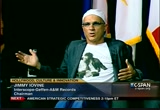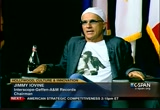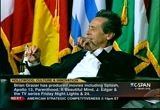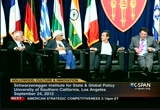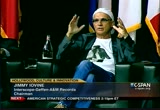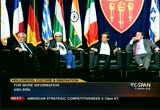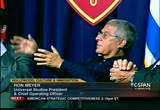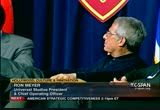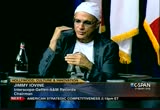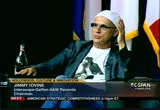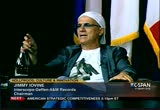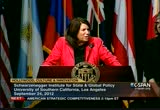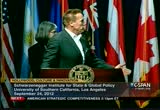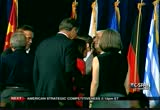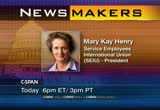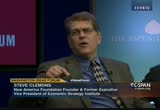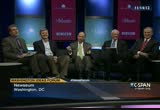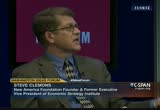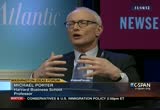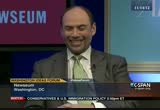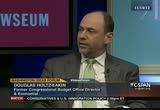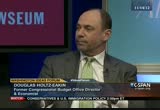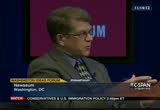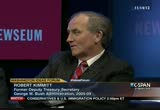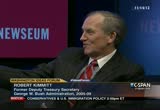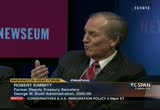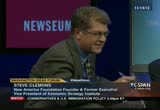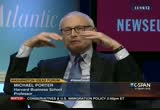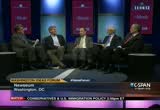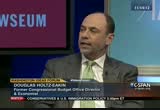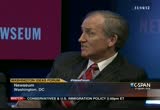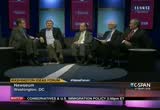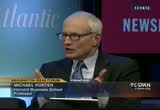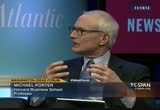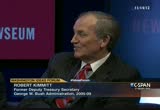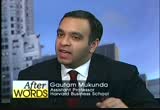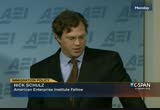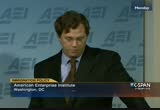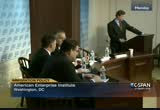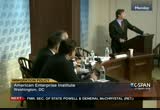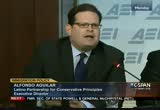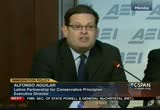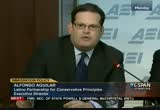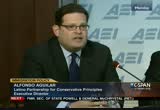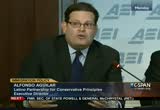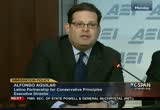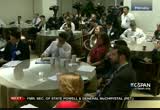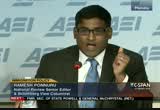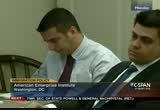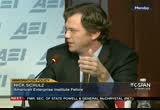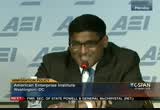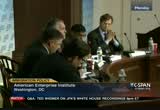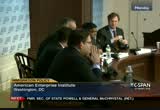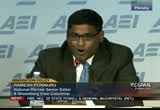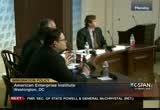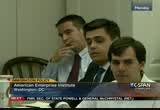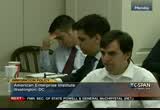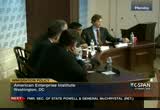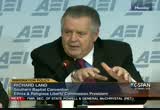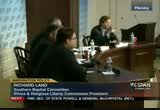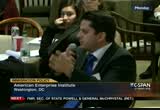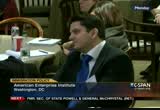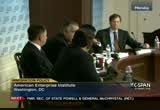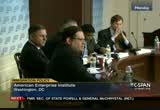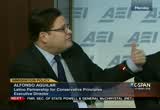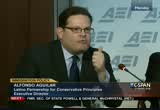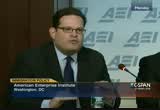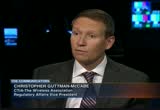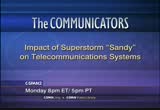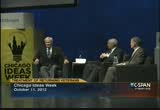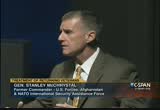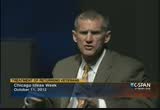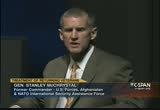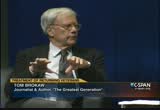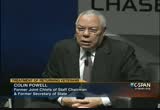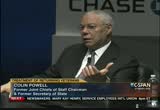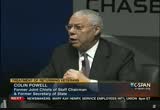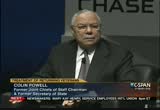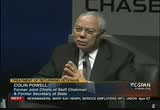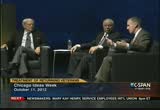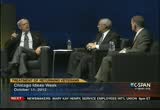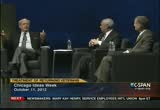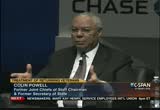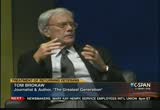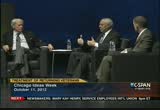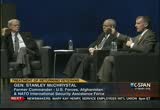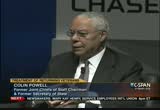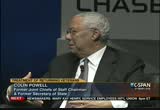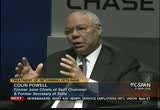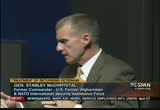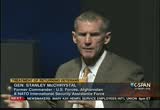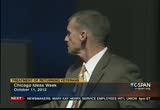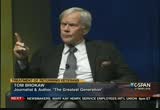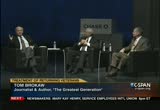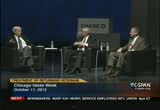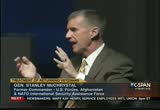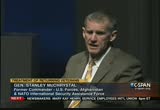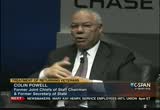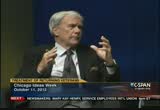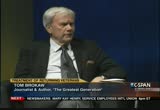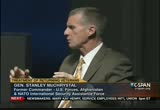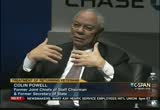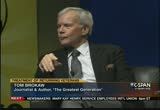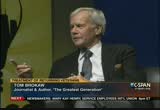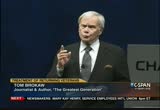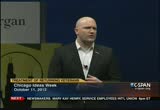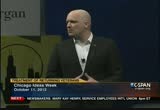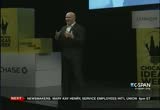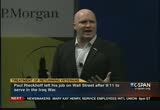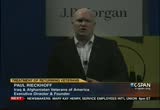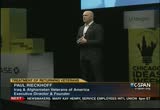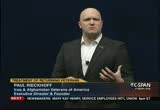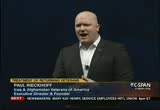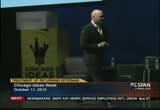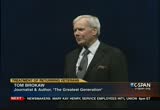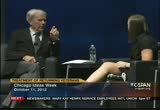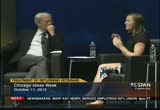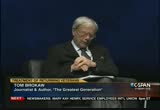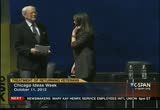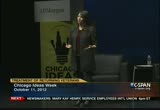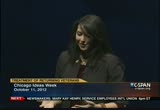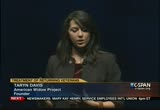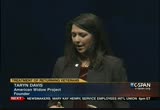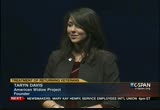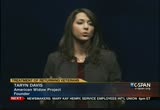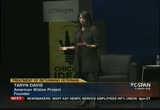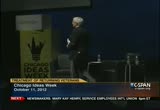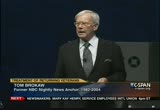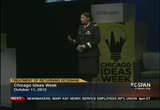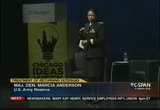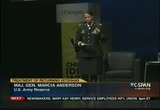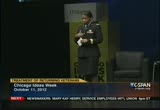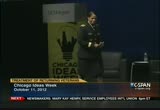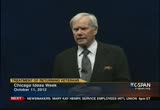tv Washington This Week CSPAN November 25, 2012 2:00pm-6:00pm EST
2:00 pm
his early albums like "born to run" or "wrecking ball" today, it's a very similar aracter -- character that's gone through life with him. just general america. it's true that it's harder today than it was for my generation, but there are some opportunities. but i think bruce -- bruce is a very unique character, a real life force. you can always learn a lot by watching him and listening to him and he is a working guy. when i first met tim -- him he was broke, living in a surfboard factory. and the most impressive thing about him which i've always tried to emulate ever since, but never been able to quite get there, he was completely uncompromising. there was nothing anyone had that he wanted that would make him compromise his art or his position, you know?
2:01 pm
and he's that guy. so i don't -- i mean i just think that america, like everyone else believes or most people belief, is at a crossroads right now. if you go to other countries, especially asia and other stuff, importing all their students to get educated here and exporting all the brain power out right after that, i think it's a real problem, you know? but there's nhing i can do about that except try to make great music and great headphones. >> next question, please? >> i really enjoy the conversation you all were having about the entertainment industry an the -- how it relates to the technology industry because i come from an industry that's sort of a marriage of both, the video game industry. of. i study at the school of cinematic arts but my specialty is video games. my question, inhe spirit of
2:02 pm
all that great informati sharing you all obviously do between the music and film stry, where do you think we are? what are the big challenges in trying to work more together than the current state of affairs? we're all trying to figure out how to work together and there are things like games based on movies and movies based on games. >> [laughter] >> i'm not sure -- you said made in america. >> i couldn't hear. it sounted like you. [laughter] >> i think you should dive in. >> mide in america was a
2:03 pm
manifesto made by jay-z and ron howard and i were in service his two days of his idea, the two days he created this concert in philadelphia. what wea -- we wanted to do was just film it and turn it something that would further project his belief system, which is that you have go. black kids with skate boards, chinese kids with berets, and everyone is just doinhis own thing. that's what's going on. there aren't any barriers, you can access any location from anywhere on the internet. to help nurture that into a bigger platform is mething i'm going to do, and i'm sure, you should speak to it, jimmy, this is your world. >> thanks, brian. narrow the question down for me a little bit the >> i think part of the question is whether the video industry deserves to be sort of taken
2:04 pm
seriously as an artistic partner with what you guys do. >> well, i think they are. >> where possible and where applicable, you know, again, success in all businesses is really about branding and brand identity and any opportunity you have from a marketing perspective to take advanta of a successful brand and try to bring it into i new medium to try to create new product is something that we always try to do. we try constantly to take, you know, the video game industry and to work close with them to bring their vision and their creativity to our screens and to o medium. so the answer is question, sometimes we do it well, metimes we don't. >> you're up. >> thank you. >> hi. since the music and movie industries are so incredibly prevalent today, do you think it would be effective to
2:05 pm
implement mandatory courses just as math, science, history, throughout high schools and maybe middle and elementary school to educate students on music and film, rather than jamming to music and watching with your morph -- boyfriend? >> i actually think it's funny you bring that up because i've been talking about that a lot recently. think i what's being taught in music schools right now, a lot it -- of it is irrelevant the none of it is teaching them how to get into the modern industry, all the problems they will have in the modern industry. i was sitting next to the president of your school at the lunch, and usuly they go into a musk course and they're keach -- teaching you ads chords. but -- it's really nice but it has nothing to do with music
2:06 pm
today. but they communitylynderstand the communication of music, how to communicate it to their audience and i don't think in colleges any of that is being taught. i've been to n -- n.y.u., and none of it be approaches the modern record business for the modern musician. so you have deejay going out completely on their own, creating their own audience without a record company or any of thehings we are aware of because they had to grow another arm in order to evolve and stay in business. now they get $ -- paid $200,000 a night and have never had a record album. no one is teaching the modern industry with both the great ness of it and the problems of it. i think it's time for a new curriculum in music and i'm very interested in because they had to grow another this. thank you. time for a couple more. next question? >> thank you. we touched briefly on the effect of social media for your
2:07 pm
industries, where we're seeing youtube, stars are coming out of the living room and korean pop stars are shooting to the top of american charts. just via a video on youtube. i was wondering if you guys could discuss the pros and cons of youtube on your industries and how it's actually changing how you guys are doing business? >> i'm not sure that it's just youtube. i think that all of the sort of social media is you guys could discuss having an effect on our basic business. i mean i use -- we had a -- "ted" was our film, and seth mcfarland had a million followers before it ever came out. we were able to, our marketing group was able to, sort of along with seth, treat ted as his own personality. first he became a personality, then ultimately he maim -- became a star, whether it was through facebook or twitter the
2:08 pm
he had his own, ted had his own blog, and so before the film came out, we were able to create this personality that really never existed before. so when the movie came out, he had as much, ted had as much rogsnition as brad pitt. that's reality of it. so i think all the social media haves -- has a real impact on how we market things and sell our product. when you see, i forget, i watched it, jimmy, you telle, was a documentary, i guess justin bieber was discovered on youtube. >> right. >> i thought it was pretty extraordinary. i saw a young agent who saw this kid on youtube d went and convinced his mother to sign him. i think that's fantastic. when whether he -- when we were all growing up in the business, nothing like that ever existed.
2:09 pm
>> but those are the benefits that the artist community is receiving. on the other hand you have giant corporations, who we're all as self-serveing a as the next guy, i guess, but what a company like youtube does, they have user generated content, which is they take the song, put up a lyric video and they hide behind safe harboor -- harpor lies, and a lot of piracy, those musicians you talk about like justin bieber are selling 1/10th of the records they do because after the record comes out, it goes up on youtube or blogs and gets listened to for free. the music industry hads a lot of leverage the while we were hit -- hit with piracy, we were also hit with the degradation of our music. we spent thousands of thrors --
2:10 pm
dollars and musicians spend thousands of hours making sound. we had bad m.p. 3's all over these, compounded by the little ear bud that came with the i pod, then computers that were made for talk. most computers, their speakers are facing down at the tabletop. it took me three years to convince one computer company to face the speakers up because they don't care. they say people don't care about sound. so that's kind of why we started an audio movement. but what i really tried to prove is how much inuence we really have over the tech bases -- business. don't know if you noticed this, but a month ago, apple, one of their ads is that our ear buds now sound better than they did. we put cultural pressure on them and on h.p., h.p. backed
2:11 pm
us and their computers sunday ssh sound better now. people are starting to do notic than this, and to face their speakers toward the listener. so, you know, we have a lot of influence over a lot of these tech companies. we should take advantage of that and use the experience to make the consumer better and help the artist realize the things -- that question you asked about bruce springsteen, there's thousands of musicians that are not realizing their dreams right now because they're being caught up in this crazy technology cultural wore -- war. that's why dee jase existed and they said screw that, i'm going to go make my own career. we have a lot of influence up here in the community of the arts. we can get the technology companies to do whatever we want. tomorrow,, and to face we can s -- no, january, to be frank --
2:12 pm
can he -- we could stop giving them user generated content ke that, but the record industry because -- does -- doesn't have the guts to do it. you know why? because google will come september and write a gigantic advance and everyone will say, oh, i'll make my numbers this year. they take the advance. it's kiting the we have a lot of juice in this area and we should not shut them down but get them tolay ball in the ecosystem. i'm afid we're out of ti. the institute's director are going to come up for a quick set. but thank you all for participating the [applause] >> thank you. nancy and i just want to thank everyone that was here for our inaugural symposium and we hope we have teased you with the kind of brilliant leaders we're
2:13 pm
going to bring to u to explore public policy. like arnold says, it doesn't matter what there political persuasion or philosophy -- philosophy, we will bring the best and brightest people together to explore the solutions. >> now i'd like to invite professor arnold schwarzenegger , my new colleague, professor, to join us. >> to close the day. [applause] well, thank you very much. i want to again thank everyone that was involved in putting this event together. i'm going to thank them because it takes a lot of people to put something like this together. i want to thank also the press for participating here today and the panelist again. i want to thank you guys. i know you are very busy running your companies and under a lot of essure all the
2:14 pm
time to produce the grosses. taking time outor something important, i think this is what the schwarzenegger institute is all about, to expose the students to the best of the best, no matter what the party affiliation did -- is and to inspire them to go in directions to become great leaders in the future the ands thanks to all of you for being here today. thank you very much. thank you. [applause] [captioning performed by
2:16 pm
2:17 pm
house for a meeting that the president held with business leaders and members of congress. bart today at 6:00 p.m. eastern on c-span. join us tomorrow for a discussion on a for-profit education and. speakers from the bill and linda gates foundation and the indication department will talk about federal rules and the role of an enterprise. it begins live monday at 10:00 a.m. eastern on c-span.
2:18 pm
what's it would be a shame to waste all the influence in that office. >> they serve as a window on the past to what is going on. >> she becomes as the chief confidant. she is the only one you can trust. >> many of the women were first ladies were writers, journalists. >> they are more interesting as human beings than to their husbands if only because they're not defined and limited by political ambition and. >> socially adept and politically savvy. >> dolly madison loved every
2:19 pm
minute of it. >> you cannot rule without including what women want and what women have to contribute. >> you are breathless with too much looking down and i think it was too fast. not now change in pace. >> it is the most tragic of all of our first ladies. "she later wrote in her memoir she never made any decisions. surely decided what was important and will to presented. >> if you stop and think about how much power that is, it's a lot of power. >> part of the battle against cancer is to fight the fear that accompanies the disease. >> this is along the way we look
2:20 pm
out what makes it possible for countless people to survive and to flourish as a result. i do not know how many precedents have that kind of impact on the way we live our lives. >> walking around the grounds of the white house, i'm constantly reminded about all the people who have lived there before and particularly all the women. >> first ladies, influence and image, a new series on c-span and produced in cooperation with the white house historical association coming in february 2013. >> business community scholars and economists now one america's entrepreneurial leadership in the world. analysts include former deputy treasury secretary in the bush
2:21 pm
administration robert kendis and douglas holtz-eakin. >> next, we have a panel of america and where it's going to. driving the panel will be steve collins, the impresario of washington ideas. >> a thank you. >> thank you all for joining us. armed washington editor at large at "the atlantic." howant to chtell you amazing this is. this is one of three times that
2:22 pm
they have allowed an outside group, the other happening to be president of the united states and onetime madeleine albright coming in to do with teleconference. this is the third time they have opened this upper for a during the day session. this is a great partnership and i want to think the museum for doing this. i have got a friend hear some more. he was the founder of circuit city and he has just written a book called the rise and fall of circuit city. to some degree, they are uncomfortable truth is when you think about nations, companies. of there certainly rise and fall stories. political campaigns are really lousy times to think about the hard truth of what is happening. one of the hard truth about our panel is that we are five white guys. we try to figure out how to
2:23 pm
divvy this up. we're four tall guys and dog. we are very aware of this. for all of you to e-mail the in, we know. what i wanted to get into today and talk a little bit about are the strategic economic choices facing the nation. what does that mean? we talk about strategy and economics, is there something more fundamental about the way the united states is positioned in the world and its choices? michael has his own followers and accolades. jeff bingaman and i and our whole staff were riveted from much of his staff and guidance at the time. had he moved in along some of
2:24 pm
the issues we're talking about back then, the united states might not be in the same position. to his left, we have the smart guy who would have evolved from a would have come in that we could have seen as national security adviser. his deputy secretary the treasury under bush. he is a senior foreign policy ambassador to adjourn year -- germany and one of the few people who synthesizes the economic and the national security in such a holistic way. his dad was a famous democrat and was one of the reasons i moved to washington. to michael's right, we have doug holtz-eakin. he ran the congressional budget office and he is a very distinguished economists. economichn mccain's advisor and he is now running the american action forum. of his one of the best out there
2:25 pm
on fiscal issues but he does it kindly. and then we have steve. i wanted to give him chairmanship of the jobs council, but he said jeff immelt has that, but not for long. it is one of the founders and chairman of aol. he chairs the entrepreneurship counsel for the president. the interesting thing about the sparks for creativity. michael, you have been involved in a major study with the harvard business school. you're engaged thousands of people, thousands of voices coming discussions with hundreds of economic leaders and you have come up with an eight-point plan. i have gone through its and some of it makes a lot of sense to me. it would have made sense in the 1980's camera so it makes you think this is such a big deal now? >> we have had a chance to
2:26 pm
interact with the jobs council and we have a tremendous alignment. the striking things that we found is that we all agree on almost everything that really needs to be done to accept we just cannot do any of it. this is now one opportunity we have to break out of that. >> let me just interrupt. you say the emigration of highly skilled individuals is one and it several like sean hennessey is on your side now. -- sean hannity is on your side. it to frame this up, this fiscal cliff issue women talking about all day here and all week, is really important. we have to make progress right now towards a sustainable budget and we have a lot of expert sitting here talking about why that's important, but there's a
2:27 pm
much broader competitiveness problem facing the u.s. right now. and it has been building for decades. it is not something new. it's not a recession. it is is sapping the ability of the american economy to grow and it is topping -- zapping the ability of the average american to rise. until we look at the major core issues that are making the u.s. more attractive to business, we will go back to the fiscal cliff discussion over and over again. unless we can get our economy really moving and growing in the long run, these will just occur over and over again. we identified eight areas, as you mentioned, where we find there is broad consensus where we believe these things would really move the needle in a reasonable time frame, two, three, four years. there is some real bipartisan
2:28 pm
support. the first is the need of a sustainable budget compromise. that is widely accepted by all. two, easing on highly skilled immigration now. yes, when a broader immigration reform, but this is one of the abilities to really move rapidly to inject skills and to the economy and fill jobs badly need to be filled to sustain our growth. it is not a long-term solution and there, but it is a critical step we can take now that would really move the needle. we have to realize a corporate tax cut. everyone agrees. we just did a survey including members of the general public, business leaders with the general public. 70% of the general public believes that we need to simplify the corporate tax code. that is how deep the understanding of the problem is.
2:29 pm
we cannot have a tax code that is simply complex with more complexity than virtually everywhere else in the world. >> four, five, six? >> we have to talk about the distortions in the trade system that hurt a high-service, high technology system. we did not worry about them so much when we were doing well, but now it's really getting in the way. we do not need to dumb down the regulation but just go through the process in a more logical and efficient way. this was the number one thing that the thousands of business people we interviewed and surveyed said that was the biggest barrier to investing in the u.s., the complicated regulatory infrastructure. we have to focus on the part of our infrastructure that are economically important. and the pork-barrel system. understand that the things that are driving up the costs of
2:30 pm
doing business, we know what they are, but we need a plan going forward. finally, we need to create a framework to rapidly create the windfall that we have gotten from this whole revolution. we now have a path to energy independence. that is a $200 billion deficit right now. it is a bridge to renewable energy. if we can move to gas, we will get tremendous benefits in terms of a cleaner energy on a way to a renewable energy future. if we could get those things done, this to be transformational for our economy, but we cannot act on these things even though there is a lot of bipartisan agreement. >> let me just try to poke holes in this. if we rolled back time to just before the financial crisis. look at the u.s.. doug holtz-eakin was out there bitching about that already.
2:31 pm
it's much worse today. if you look at debt in a different way. if you look at private-sector debt -- just forget government debt. private-sector debt was 160% of gdp. despite the myths of the leveraging, today we are back in that same crisis mode. you also have structural corruption and between regulators, financial institutions and other players in the economy and you have a private sector events leading to a government response. my question is why is it never on this list to get the private sector robber control? there is nothing in here saying we need to bring it down or get better behavior? it is a question i want to ask you because you have been on the side of government debt. when you think about restoring the darts in the u.s. economy
2:32 pm
and the consumer and a look at how much debt overhang is out there, if you leave the private wait out there where it is today? where is it? >> there is a lot to that. we did sarbanes oxley to get transparency on the balance sheets. this takes care of the finance and making sure it is all cleaned out. >> corruption and. we will have that discussion later. >> things happen. the bigger problem is the flip side. now, we realize people just do not save enough. that has been true for a long time and we have never fixed it. we have financial problems and it's driving the fact that we have problems and a financial investments have gone up worldwide. americans do not have a way to
2:33 pm
take advantage of it. we're going to played a land war in asia over tax issues that will never work if we do not get ahead. >> there are a lot of issues which need to focus on in a forum like this to do this. jummy, and there are many issues but there is one that is central. that is making sure that we remain the most of the prairie on nation. this country was the start of 200 years ago and has grown to be leading economy in the world and the leader of the free world on the backs of notches the patriots who helped form the country but entrepreneurs who took risks and created and tire industries. we need to build on that and make sure we remain the leaders. while we're having these debates, other countries have gotten much more focused and they recognize the secret sauce and the power of the american economy is on the partnership so
2:34 pm
they're changing their policies around immigration, capital incentives, investment, research to invest more and drive more. we're seeing a globalization of want to print your ship. the good news is that as we sit here, we're still a leader and we can build on this. >> is there evidence that we are the leader? is this faith based? >> the evidence is based on where the innovation is still coming from and where on to partnership is of fundamental. accel partners, they were all in some lacan valley and now they have more in china 10 years later. that says the context that is troubling. the one area this year were congress did work together in a bipartisan way in support of the
2:35 pm
president was the jobs act. it is very important for entrepreneurs in areas which do not have venture-capital, most of the market. >> a you love government? >> government has the context with access to capital. i agree that the issue of immigration as critical. high skilled immigration needs to be in the mix. there's more work to be done. there is now a bill that was introduced in a bipartisan way by senator rubio who will be here in the morning called the start up act 2.0 and it deals with high skilled immigration and it deals with some of the issues about regulation and so now that we have the election over, we have to focus on passing the sites. we take that step and we focus on them creating these new industries, i am confident we
2:36 pm
will remain the most logical relationship. other nations was are racing or were and there is a reason to be concerned. i look at it may be optimistically by saying the losses have fall. >> michael has been an optimist and he's saying we have a chance here. can i invite some pessimism >> i am fundamentally optimistic. [laughter] >> unbelievable. a budget guy. if you think about the structure of the budget which reflects the value of evidence in the political system, we have huge programs which are basically legacy programs serving all americans and those programs are crushing the discretionary accounts, where we fund national-security, education, the core investments.
2:37 pm
this allows the path to crush of the future. it is against what they talked about. we have to agree that innovation will solve health care, educational, energy. look at what fracking has done. we're not doing any of the is thing is. >> i want to jump to bob year for a second. we go round world "for 9/11 in 2001 and you talk to other nations, a very international crowd and you ask them what they think of the united states, they admire the united states and they resent the united states because they did not believe there were any boundaries to what could be done. they saw us as the most innovative place in the world that they could constantly
2:38 pm
reinvent themselves. today, they see in nation unconstrained, tied down, limited. militarily overreaching, and you have been talking to timothy geithner and we as bluster, can you go around and really tell the economy what to do? it is limiting. when you look at barack obama's first meeting with angela merkel were the global economy was on fire, she laid down the gauntlet. we're not going to play by your rules. we're not want to spend like you're telling us to and it has been very interesting to look at the limits we have even influencing a nation like a german name. in brussels, do you think america has the same way we once had and can influence the international system box i would love to see how you see the challenges ahead but the milly a geostrategic context.
2:39 pm
>> first, a strong economy is as cruel as a strong military. in this post-financial crisis era, economics and finance are every bit as important those traditional diplomatic and military lepers of policy. the throw weight was the measure of how much could be delivered through nuclear arms. sovereign interest rates are the measure of strength and invulnerability now. this move from a throw rates to interest rates. they knew how much megatonnage we had and it'll merkel can tell you what the spread is in the most recent greek bonds auctioned. requires a change in thinking on our part. the world as always looked to the u.s. in a somewhat perplexed fashioned.
2:40 pm
people never thought we would get off the ground all those years ago. at once, they're cheering for us to be successful but they're concerned that we could be successful in a stairway. bottom line, we came very crisis -- we came through a crisis, but we still have dual deficits, low demand growth in europe, and an undervalued currency in china. it is time to recommit with confidence to the three elements of a successful global economy -- trade, flexible exchange rates, and the free flow of capital with open investment policies. i give credit to the obama administration. have been a very good on and investing. he was the first to put out and open investment statement in 40 years. why? foreign direct investment create
2:41 pm
jobs that are disproportionately export-oriented manufacturing- oriented, and 50% unlike the to be unionized. we need to approach trade in the second obama term with the same degree of confidence, to the point michael made. i think the world is ready to engage with us. angela merkel proposed this after a speech in basel. out in asia, the chinese are now part of negotiations and they're following it very closely. we need to succeed in confidence. >> he mentioned china, thank goodness. you cannot have a dispassionate without talking about china. larry gorda to do is mitt romney winds and on monday one
2:42 pm
calls china a currency -- what are you going to do low-cost if brett romney on that date one calls them a currency manipulator? bill would send these notes out say we are a bigger china basher than romney. it was a real issue during the debate. do you remember them talking about china? it has disappeared. to come back to michael's initiative, but we are talking about china. we're talking about people coming along. this is really the opening of former for us with a washington acadia's forum, but we got into a discussion about china. bono said we were not careful that they would end next the
2:43 pm
continent of africa. there is so much strategic interest in america is largely absent which brahma's this back. if we get this stuff right, will list just make us feel good, or do you actually gained ground in a competitive environment against china? >> we absolutely gain ground. we have real strengths in america. we have strikes in all the things they died for. on real climate, as in technology and, dynamism in this country with a lot of strength. we have allowed a bunch of unnecessary costs of doing business to creep up. basically by an action. at the same time, i work around the world on this topic and all the other countries have task forces of leaders who work every day to drive down the cost of doing business to make the a for structure better, making better
2:44 pm
ways of communicating in making it simpler to do business. we have taken this for granted that we have these great strengths. we have not been able to make progress. we are talking about keeping our infrastructure modern. we are talking about not throwing all kinds of obstacles in terms of the regulatory approach, but it simple stuff. to me, i'm optimistic because of the core strength, but the real concern is how can we take action? how can we be a strategic? how can we actually start taking initiative began in moving this country bore work? >> do you think it's possible? we talked about this. what i see, to be quite honest, there is not a lot of strategy today and it is very reactive to the events. we have a world where we wait for a crisis and then move. dissuade me from that.
2:45 pm
you worked for john mccain. you hung out with eric cantor. overwork crystal be here tomorrow. these are your pals. -- grover norquist will be here tomorrow. first, is it fun? [laughter] and my role stocks i agree with a lot of wear my blistering to take us, but as a realist be used to work for richard nixon, look at the world as it is, as i hope it might be. do you believe, given the people you know, that there is a chance for a strategic response to these things? they are a response to respond because of their inability to get along because of the people in the white house. >> we don't get along, but that's been true for a long time. we would out to go back to a different kind of leadership, a kind we had with ronald reagan presidential leadership matt, here is what america needs. i will send this bill in to the
2:46 pm
congress saying we need to do this and what that does is congress is able to say, we do not want to do this. this is not my choice. >> maybe obama ought to make bill clinton is fiscal cliff envoy? >> i thought he did? >> this is important. to bridge that experience. first of all, veterans in leadership. secondly, i want to go back to that thought. we have to be more outwardly focused. we have given up engaging in africa and around the globe. with all the income growth out there, having those ties helps us in defense issues and other things. we are not doing that now. >> one of the easiest places to get republican support for a new agenda, so maybe it, we get it right, but -- what would a new
2:47 pm
american renewal agenda be comprised of? >> let's negotiate a trade agreement. president obama is the first president to not negotiate one. >> south korea. >> they were negotiated in the previous administration. we have an opportunity right now in europe and asia to knock down barriers, tariff and non- tariff barriers and you would get overwhelming support for that. it would have been tougher in the first term. this is a time to move on from that. the only point i would disagree with my goal is the just mentioned europe and japan have the in much worse than we did. we need to help our current largest trading partners getting it right by knocking down these barriers to we can engage china and the other emerging markets in a way to serve everyone's best interests.
2:48 pm
>> what would you think about this as a possible secretary of commerce. >> the world still in of these the american and innovation, as michael would say. they're pretty good at scaling, but not so good as inventing the early stage, the scale up. they are quite envious. this is why we still have this opportunity. i want to go back to the issue a bipartisan accord and talk about the president and also the republican side. the president did create a council that he asked me to co- chair and got the ball rolling. we created a jobs council, as you mentioned it and he created as part of the entrepreneurship effort. he wanted to push everyone within the government to focus more and we created a startup america partnership in a private
2:49 pm
sector effort. the jobs council made recommendations about a year ago for a road map to get us back. that led to the jobs act. that only god on because the president got it put on the table. and the rally in the house to support it. 80% of republicans and democrats in the senate and house who voted for it, the reason is all the net job creation is from high-growth companies. 8% unemployment rate down and 2% growth rate up and staying competitive globally? the pleas to double down is innovation and entrepreneurship. >> now the election is over and it must happen. there is recognition of both sides that this is important. many issues are being debated and they are all important issues. the most important is making sure we double down on on entrepreneurship and build on
2:50 pm
our lead. we know what we need to do. we need to build a bipartisan coalition to make sure it happens. >> this is exactly what i think we need to do. >> we outsourced to the congress. i like that. i like the idea that we are looking outward on trade, jobs, something like that. talk to each other again. we do not have to get to these big decisions were they do not even know each other and they have no idea what their common ground is. that's the problem. >> a very much agree with the assessment. we have apple, but they did not make anything in america. what does that tell us? we have agreements, but we have made the cost and complexity of doing business in this country prohibitive. as bill gates said earlier, we
2:51 pm
need our skill base to have employees earning that i wager that americans need to earn. ultimately it's part of the solution, and have been bipartisan to support small business, but frankly, we need to create an environment to support all business. but we're going to take advantage of our success, comeback to a lot of this is blocking and tackling root, be a long-term, being a strategic. our international alumni have been even more anxious that the school took this on and more positive than even our domestic alumni. we believe most of the people in the rest of the world actually understand that a successful
2:52 pm
american that is growing and vital is a powerful thing in the world. we have been able to create positive dynamics in the way that the global economy has developed. with that america pushing, what are the alternatives? do we really like the chinese economic model was the new view of how the world economy will work? >> alix clarify one thing you said. business in general, we want to support, but if you look at the jobs growth, it is not from small business or big business. it is yawl, high-growth entrepreneurialism as. >> there is a good article about that and it hits me over the head of the time. small business and large business -- >> young business. >> the future of america is going to be no, high-growth and
2:53 pm
that is where we need to focus. the start up by and does that. many to remain a startup nation. >> when i normal world and i ask people what they think the source of american power is, the either side pentagon or the size of the federal debt. if you're the biggest debtor in the world, it gives research and power. are you optimistic that these can be reversed? 30 seconds. >> some very optimistic about america's future. we have to approach that future with confidence. we have to get our house right, but we have to be prepared to engage with confidence abroad. we are still that shine a light on the hill that people look to. they are disappointed when we don't deliver. we're disappointed when we don't deliver. i think we can, both at home and abroad, find a way. it will not be simple.
2:54 pm
our government takes longer to get things done than a real economy would like. of the end of the day, i am optimistic. >> . q.. -- thank you. they care so much. steve case, michael porter, robert kimmitt, douglas holtz- eakin. host: caller: -- [captioning performed by national captioning institute] [captions copyright national cable satellite corp. 2012] price talking about the so- called fiscal cliff and what the unions have at stake. our guest was at the white house for meetings president obama held members of congress about the fiscal cliff. watch today at 6:00 p.m. eastern here on c-span. as the moral free discussion on for-profit and federal education
2:55 pm
policy. speakers from the bill and linda gates foundation and the department of education talking about the role of private enterprise in education. live coverage beginning at 10:00 a.m. eastern on c-span. >> at the democratic mayor spoke conventional come of this rhetorical bluster peace making him a figure. four years later, without that speech, he is not a viable candidate for president. this is a beautiful testament to the mind of lincoln and, his speech. well worthy of praise. when barack obama gave his speech in to the court, he was running for the senate and one. abraham lincoln one of the senate -- ran for the senate and he lost. think about barack obama running for the presidency in 2008 if he
2:56 pm
had lost not if he had want that? that is the level of national security we're talking about here. >> profiler historic and modern leaders to show the lesson that can be learned: those who have the greatest impact. "after with booktv' words" on c-span 2. >> lakes, a discussion on immigration reform of the latino vote in the last election. panelists are from the southern baptist convention and the texas immigration the solution. this is one-and-a-half hours.
2:57 pm
>> good morning, everybody. my name is nick shulz. i'm here at the american enterprise institute and i'm the editor of american.com, a.e.i.'s flagship online magazine. i want to thank you for coming to our event today. conservatives and immigration reform, now what? i'd like to thank -- before you start, i'd like to thank my colleague, dan rothschild here who helped bring this all together. he's had an interest in this issue for a long time, as have i and it's timely and important that we start talking about these things. there's been a tension at the heart of the conservative movement's approach to immigration for at least as long as i've followed politics and a lot longer than that.
2:58 pm
there are two influential camps that have jockeyed to define the right approach to immigration policy. this will be accrued generalization, but i believe a fair one. on the one hand there are economic libertarians. they don't mind so much the presence of large numbers of immigrants here in the united states illegally. and they would also welcome much more legal immigration as well. we can call this the "wall street journal" wing. on the other hand there's social and law and order conservatives, who are concerned about preserving america's unique culture and the maintenance of social order. to these conservatives the presence of large numbers of people in the united states and in violation of american law is inherently problematic. what's more, many of them aren't wild about the influx of large numbers of illegal immigrants either, arguing that any culture needs sufficient time for new arrivals to assimilate and that cultures
2:59 pm
can benefit from periodic pauses in immigration. now, there's some other camps as well, for example, moral and social conservatives, such as some in the catholic church and other religious groups who favor what might be called a light-touch approach to immigration on what they believe are social justice grounds. but the broader point is there is a deep tension and division on the right on immigration, and there has been for decades now. the recent presidential election has brought the immigration issue once again to the center of american politics. governor mitt romney received a small percentage of latino and asian voters, much less than george w. bush received, it's o noted. many have said his views on immigration and conservatism's approach to immigration generally were to blame for the g.o.p.'s poor showing this time around. it's worth noting, i think, that romney tried to appeal in some respects to all factions
3:00 pm
-- all conservative factions on immigration. he repeatedly said that he was in favor of more legal immigration, emphasizing "legal," but also particularly during the primary season he took a harder line on the question of illegal immigration. what we at a.e.i. have decided to do in the wake of this election is convene a thoughtful panel of folks to discuss conservatives and immigration reform. i should note that this is the american enterprise institute for public policy research. it is not the institute for figuring out how to get conservatives elected or how to get republicans elected. we're interested in finding the right solutions to public policy problems and issues, and immigration is no different. so i asked our panelists, while the temptation in this present moment will be to talk solely about immigration in the context of electoral politics, and that's certainly an interesting and appropriate thing to do, it's more important that we make progress
3:01 pm
in analyzing and elevating sound public policy on immigration. if those policies happen to be political winners, all the better. now, we've seen lots of pundits and policymakers in the wake of the election offering advice, such as republicans should get behind a one-time amnesty or republicans need to back comprehensive immigration reform or republicans need to stop building walls and start reaching out to more hispanics. maybe these are wise stems. but almost all of the analysis in the wake of the election has been driven by concerns about political expediency and not necessarily because the person advocating this position believes it's sound policy. it's not even clear to me that many of the proposals are good politics either, and that's something i expect we'll get into today. my hope is that in general we can do better. to do so we've assembled a distinguished group. we have allfonso aguilar, the executive director of the latino partnership for conservative principles. he was the first chief of the
3:02 pm
u.s. office of citizenship appointed by president george w. bush. he was responsible for developing and promoting initiatives and programs to educate immigrants about the rights and responsibilities of citizenship and encourage their integration into american civic culture. brad bailey is the co-founder and c.e.o. of texas immigration solution, from 2000 to 2011 brad was vice president of operations for three bailey family-owned houston area restaurants. he co-founded immigration solutions in 2012. the group seeks to develop and advance conservative solutions to u.s. immigration policy. brad also served on the 2012 platform committee of the republican party of texas. richard land is president of the ethics and religious liberty commission. that's the southern baptist convention's official entity assigned to address social, moral and ethical concerns, with particular attention to their impact on american
3:03 pm
families and their faith. richard is also executive editor of v.v.f.f.v., a magazine dedicated to traditional religious values, and christian cultural trends. last, my friend, ramesh ponnuru a columnist for "bloomberg view." he's published articles in numerous newspapers, including "the new york times," "washington post," "wall street journal" and the "financial times." he's also the author -- i didn't even know this until today -- of a mono graph that a.e.i. published in 1995 called "the mystery of japanese growth." he's a fellow of at stanford's hoover institution. here's how this is going to work. we'll have our panelists each talk for about 10 minutes, and i may ask questions as we go along. but we're going to leave plenty
3:04 pm
of time for questions from the audience. so as you're listening to our panelists, please keep in mind that we'll have microphones that will go around later so we can have a nice spirited discussion. so with that, i'm going to start with alfonso, open up with you. >> thank you very much for the opportunity to be with you this morning. certainly i think there has been, since the election, a seismic change in the political landscape when it comes to latinos and immigration. and i'm encouraged by that. i'm optimistic. i think next year we may actually get something done that is constructive on the issue. when we talk about immigration it's kind of hard not to talk about the politics of it, because frankly i believe that if we haven't been able to achieve immigration reform, it's because of the politics, not because of the american
3:05 pm
people. the american people, poll after poll shows the american people want to see immigration reform and they want to see it soon. they're for border security, but they want to see some form of legalization, a program for a path to citizenship so. it's no surprise to me that somebody who was very involved in the election cycle that govern romney lost the election. i think the writing was on the wall, and i and many others kept saying before the election that we had a problem with immigration. and i know that after this election there would be a lot of introspection and analysis of how to get the latino vote. but at the end to me it was the latino vote or romney not proceed veiling precisely because of the latino vote and
3:06 pm
specifically because of the issue of immigration. if governor romney would have had a more constructive view on it from the git-go, he would have been a more competitive candidate and frankly at the end he would have ended up prevailing in the election. he didn't win, contrary to apparently what he thinks, not because latinos voted for obamacare or entitlements, they just didn't like him because of the things he said about immigration. you remember what he said, people should self-deport. sounds something very similar to what chris could vac would say, the secretary of state of kansas, who was one of the co-authors of the arizona law and very involved with the main anti-immigrant groups. and in fact, when chris kovak endorsed mitt romney, mitt romney went out of the way during the primary embrace that endorsements and issued a statement saying that chris
3:07 pm
kovac was a great leader on the fight against illegal immigration. i don't think it was necessarily governor romney's idea, it was, i think, the idea of many g.o.p. establishment strategists that you run a campaign during the primary, being a restriction as being anti-immigrant and then after the election you do what i call the old switcheroo, you change or soften your position. the problem with that is that it's very condescending, because latinos were listening. so after the election when you say, well, i didn't mean a model for the nation, i meant a model for the states, and then you say i didn't mean the entire arizona law, i meant a portion of it, people are like we just don't trust you. so in the end i think the vote was for obama because they didn't trust romney on the immigration question, they
3:08 pm
didn't like the rhetoric. and there was no reason for this, because as i say, the majority of the american people want to see immigration reform. and this is something very important, and this shows why politics have to do with immigration policy. i think the anti-immigration lobby has been very effective in creating the perception that the conservative base is anti-immigrant, and that's just not true. poll after poll shows, study after study shows that the majority of conservatives believe in border security, but also believe in immigration reform. at the latino partnership, before the primary season, we had a study to study the immigration vufse likely republican primary voters. these are your tea partyers, people committed to the
3:09 pm
conservative movement. as long as you had border security there, they supported legalization, they support add path to citizenship, they supported a guest worker program. we included that word amnesty. when we included border security plus amnesty, 52% of them supported that idea. so the anti-immigration law -- and what i mean by the anti-immigration lobby, i mean specifically the federation for anti-immigration reform, immigration u.s.a. in 2006 they got very involved in the political process. they influenced a small group of republicans to hijack this issue and articulate a very anti-immigrant restrictionist rhetoric, which led -- in 2006 they used it as a wedge against immigration. republicans lost the house and senate. and for six years, from 2006 to 2012, the republican party has been perceived as a
3:10 pm
restrictionist party, even though in the maurer ra all of our presidential -- all of our presidents, all of our presidential candidates, have been pro-immigration. railroad was solidly -- ronald reagan was solidly for immigration reform. if you google it, you'll see ronald reagan making the case not for legalization, but actually for amnesty, using that word. now, i think the majority of republicans are pro immigration, but they have been afraid for the past six years of that anti-immigration lobby, which has an incredible political machine. anybody who says anything constructive about immigration will be called -- will be labeled pro-am necessity, and certainly some talk show -- tv and radio talk show hosts. i think this election cycle has dramatically changed that. i can at least number half a dozen radio and tv talk shows that had already said, you know what, my position has evolved and now i'm for immigration
3:11 pm
reform. but that is good, because it will give cover to a lot of republicans who have avoided this issue who want to deal with this issue to actually do it. so we have to reclaim the issue, and we can do it because being for immigration reform is actually the conservative position. restrictionism at the end is part of the nationalist, perfectionist paradigm. if we are the party of the family, if we are the party of the free market, the g.o.p. is, we should not in any way have a restrictionist position. if we are for the family, i don't think why we should be calling for separating hundreds of thousands of families in this country, many families that have been here for decades. if we're the party of the free market, why should we tell -- why should we believe that government should tell american companies that cannot find
3:12 pm
foreign workers, that cannot find american workers, that they should be able to bring in foreign workers in an effective, timely fashion? that goes against the basic principles of the free market. so we can reclaim this issue and frame it in conservative terms, because as i said, we're the party of the family and we're the party of the market. now, what exactly this is going to look like, i don't know. i've started my rounds right after i got back from d.c. going to the hill and the senate and house and i can sense there's a great environment to actually do something. the question is, is it going to be comprehensive? i doubt it, because today what we knew as comprehensive reform in 2006 and 2007 is not necessarily what the administration is talking about. the president keeps talking about exree hencive reform --
3:13 pm
comprehensive reform, but i wonder if it includes a guest worker program. in the end that is the key to resolving this issue. and the unions, which the president is loyal to, don't want to see a guest worker program because they don't want to see more foreign workers enter the country. they want to ensure that the labor market -- that the labor supply remains small. and the guest worker program is key because, again, to grow our economy, we feed to grow many industries that need that foreign workforce. the last immigration reform that we had in the reagan years lacked a workable guest worker program. that was amnesty. we gave amnesty to three million vifments but at that time the market had already absorbed those three million individuals. so what happened? immigrants kept coming in to do jobs that americans didn't want
3:14 pm
or where there were simply no americans at working age to do them. so another community for documented workers was created. we need a mechanism to facilitate the legal flow of the foreign workers that america needs. and it can be a mechanism with quotas arbitrarily set by government, because in the end the issue of illegal immigration is an issue of big government. it is big government saying we're going to have this guest worker program that will be highly regulated, and in some areas, or for some type of jobs, we're going to cap, have ridiculous quotas that don't represent the needs of the market. when you have that, people are going to continue to enter illegally. so what we need is a demand-based guest worker program that allows companies who cannot find american workers to bring the foreign workers that they need, as many as they need. and we shouldn't be concerned,
3:15 pm
in a sluggish economy like we have right now, because if you have an economy that's not growing, you won't bring as many workers. if you have a booming economy, you will bring more workers. let the market work. at the end. that's the only way we can fix this problem. in terms of legalization, i don't know exactly how that will be done. but what i'm seeing from my meetings in congress, this will probably be done in a piecemeal basis rather than a comprehensive basis, and at the end i don't know if we will get -- for those who have been here for many years or even for the young, undocumented immigrants who enter with their parents, the so-called dreamers, i don't know if we'll get to a path for citizenship for them. but certainly i think for them we can probably get to an alternative dream act, suggest by senator marco rubio. but in the end it's going to
3:16 pm
depend on the willingness from republicans but also from the president to actually sit down and negotiate. it's not only republicans. i know we've heard this a lot, that it's always the republicans that don't want to do anything on immigration reform. well, nothing happened on immigration reform because the president didn't lead. he had a house and senate, a democratic house and senate. he didn't do anything to push immigration reform, and he didn't engage republicans. this time around immigration is a very complex issue. you need to press the united states to do what george bush did in 2007 to send his cabinet members to congress and negotiate with the oppositional leadership. if that doesn't happen, then we have a problem. so i want to see how willing the president is willing to negotiate with republicans. but i am optimistic. at the end i think the biggest challenge will be -- or controversy would be whether we're going to get a path to citizenship for some or not, thank you.
3:17 pm
>> i commend everyone for your work, but also for approaching the subject. i'm not a public policy guy. i'm not a washington insider. i'm a restaurant owner from houston, texas. so i can kind of tell you my kind of brief experience -- well, lifelong experience on this, but brief kind of political side of it is back in september of last year, every day in our restaurant we have what we call commita in which we break bread with the front of the house staff, waiters and waitresses, to our kitchen staff. talk about showing up on time, putting the right amount of food on the table and not wasting. owning a restaurant is kind of like baby-sitting, so it's kind of our moment to hit those points. after that i had my longtime employees, who have been with us over 10 years. he came to us afterwards and
3:18 pm
wanted to talk to me about something. but i want to tell you about this person before i start. over 10 years ago he came to work for our family's restaurant because his previous employer would not give him off on sunday to go to church with his family. it's a very important part to note. it wasn't the job, it wasn't the work conditions, it wasn't the pay, it was because he wanted to go to church with his family. turns out to be probably one the greatest employees we've ever had. i've worked shoulder to shoulder with him for 10 years. he pulls me aside after that meeting and he said, braddings i have a question for ument. i know you and your family are very conservative, and i just want to know how you can support republicans, when republicans hate hispanics. you know, my chest gets all out and i start going through my stump speech of pro-life, pro family, religious freedoms, and he just kind of nodded his head and kind of moseyed off. but that night or a um -- could have nights later was when governor perry was literally
3:19 pm
attacked by not just one, but several people on the stage. and i watched that debate. parred the pun, but houston, we've got a problem. where i'm from, yeah, we've got a problem. it catapulted into he to get involved. i called around some of my major league politically active friends and i'm like, what do we do, what do we do? one of my good friends said you're a business owner. you've seen how broken the system is. you need to talk about it. little did i know how involved i'd get. but i really pushed to get the republican party texas platform. i had never been to a convention. i always voted republican all my life. my dog's name is w. poor guy last like a 32% approval rating, but i still love him. but i just never really got involved in the day-to-day. we went to this convention and i was on the republican subcommittee, on the platform of the subcommittee that really
3:20 pm
started talking about this problem. i noticed when everyone came in we get testimony from all types of people. we have about five people on the subcommittee, and people came in thnd they were physically just couldn't stand each other. they had been fighting on this issue for 10 years. i mean, we had the mintmen militia there, the tea party groups, we had the hispanic leaders that were there, we had religious conservatives there. it looked a lot like this panel. but they really just were -- did not like each other. we started talking about things. it was roberts rules of order. you got 30 seconds. finally i said let's suspend the rule, sit around the table and start talking about it. and the minutemen militia, who volunteer their time on the border, we all will agree on this panel that our immigration system is broken. in texas we have over 1200 miles of border with mexico.
3:21 pm
the system is broken. but no one knows more about how to fix them is the minutemen militia. so i yielded my time and i said let's go. everyone started putting down their arms and started putting down their weapons and started talking about solutions. you know, complain building the problem, which i feel the 2010 republican party platform in texas looked like, was a lot of complaints, a lot of problems. oh, this is wrong, this is wrong. we all know it's wrong, but how do we fix it? i believe in texas we fix things. we've done with tort reform. we've done that with our balanced budget amendment. our legislature only meets once every two years, which washington probably could learn from. you know, our energy policy. we fix problems. we don't complain about them. and really, everyone started kind of coming around, that's right, we need to start doing that. so we came out of there unified. we had a one-pager of how we could address our immigration
3:22 pm
problem. at the 50,000-foot level, but it's one page. we went to the floor of the convention. and i'll tell you a little bit about the texas convention. it's the largest gathering of conservatives in the nation. there's 8,000 delegates at this convention. 2,000 guests and media. when we start walking on to the floor. all of a sudden i see no amnesty stickers hanging out. i see a lot of big campaigns going in. i thought we'll have a nice little debate. wrong. little did i know, it was on. they called us every name in the book. they did everything. but when we went to the floor, we had the minutemen militia testify for us. we had religious conservatives testify for us. we had hispanic people who really felt the part of the therapeutic dr. phil session that we had in the subcommittee. but five times -- four or five times they attacked our platform. not a portion of the platform,
3:23 pm
specifically our one-pager. five times they came at us. five times over 2/3 of the 8,000 delegates there supported our solution over the rhetoric of old. in that -- that opened a lot of people's eyes that conservatives really do understand this problem. i believe the vocal minority has hijacked this issue, and they've got us all fighting, and they've done that on purpose to make sure nothing happens. we want to get it fixed. you know, it's harming our economy in texas. the federal government has failed -- both sides of the aisle have failed on this. so how do we fix it? it was real interesting. when we came out of there, the media comes running into the convention. the front page of the "dallas morning news," or the "fort worth star-telegram," "g.o.p. shifts on immigration."
3:24 pm
the dallas morning news -- it was amaze together see, that, wow, we're going to come in here and label them as antianything, and it was a total different route. then some people came to me and some friends of mine said we've got to take this to the national level. we went to the national platform in tampa and started talking about it. we got a national guest worker endorsement on the national republican platform, which was great. thought my work was over. election day hits and wednesday my phone starts getting blown up again. it's time to get back in the debate again. we need to start doing more, we need to start talking about this. you know, i believe free-market solutions are a part of this. i believe in strong border security. the anti-immigration groups will try to label us as open borders, big business wants cheap labor. i can tell you, if we can fund blackwater security forces in iraq or some type of security force that is licensed and
3:25 pm
doing a good job, we need to do that. we need to secure our borders. i can tell you in texas i've been down first hand and seen in brooks county, texas, the devastating effect it has on property owners, on everything. we need to look at every option available. it is for our national security to do so. so i'm not for open borders in any way, shape or form. as an employer i can tell you for someone who uses e-verify how broken e-verify is. folks, i'm telling you right now, i am all for an employment verification system. we need an employment verification system. but e-verify makes the united states postal service look efficient. it's a government-run software program. i don't think i need to say anything more than that. it's a government-run software program that needs to be modernized. as an employer, nine out of 10 businesses have a credit card
3:26 pm
terminal. now you can get one on your iphone even. you can have visa, mastercard or american express where you swipe your credit card where it says accepted, declined, card's been stolen. why can't we have american companies take this program over and streamline it and make it more efficient, where you can get a reading, make it more -- i've had employees not pass e-verify and they had to go to the social security administration and stand in line for three days to get it corrected. that's not conservativism. how have we been, you know, spoon-fed to say that a government-run software program is a conservative solution. you can see people talking about it all the time. we need the free market to show us how we can do this. we need to take that over. but as an employer, the social security cards have not been modernized since 1936. that just blows me away right there. the same social security card. i mean, if we just printed the social security card on the same type of paper that we do
3:27 pm
with a u.s. passport that's anti-counterfeit proof or a $5 bill, it would help the process. as an employer, someone who has to take these identification documents, it's cumbersome, it's troubling. we need to look at how we address that. our temporary worker program that we passed is really kind of the biggest portion. temporary worker, guest worker, what have you. it's got to be self-funding through fines and fees. it's got to be a zero budget impact item. the other thing is that we value the american worker as number one. only if the american worker is not available for that job will we go the guest worker route. let me expand on that a little bit. i think the states should have these guest worker programs. i think for our state, texas, for example -- the texas workforce commission, as an employer, we lay someone off they go through the texas workforce commission. that's where they get their unemployment benefits. if you fire them, they appeal to the texas workforce
3:28 pm
commission. nobody knows who's unemployed more than the texas workforce commission. no one knows also our job creators better than the texas workforce commission. if they were able to administer a guest worker program versus it coming up here to la-la land disney world of government, it would be much more efficiently run process. we need the states to be able to administer these things and work with the federal government, but streamline the process, so we make sure that the american worker is number one. number one gets hired. if they're not available, then we go the guest worker route. and we laid out from health care issues to where we're making sure that each employee gets -- each guest worker has a health insurance and also a biometric identification card. so thank you. [applause] >> brad, thank you. i don't know if the moderator of this makes me dr. phil. but anyway, richard, over to you, please. >> thank you. i've noticed that there's one thing that's quite unusual about this panel, and you should have high expectations
3:29 pm
of us. all but one of us is left-handed. you have to be enterprising to be victorious over the prejudices of right-handed people to remain left-handed. so we are triumphant. poll after poll shows that 70% of the american people would be more likely to support a candidate who was for comprehensive, fair and just immigration reform that included secure borders. unfortunately, that 70% are focused more in the middle, those who are independents, than those who vote in democratic primaries and those who vote in republican primaries. and let's be honest. there are people in both parties who have a vested interest in solving this program for their own political advantage. and to the detriment of the country. this issue is rending the social fabric of the nation in
3:30 pm
ways that are far easier to rend than they are to mend. and it is time that people of goodwill in this country focus on a solution that begins to mend the social fabric instead of furred are rending it. let me say very clearly, we need comprehensive fair and just immigration reform first and foremost, because it is the right thing to do. it is consistent with american principles, it is consistent with christian principles. if you want to see a long explanation of that, i would encourage you to go to the regent university law review website where my cog league, braret duke and i have written a long bibble definition of why comprehensive fair and just immigration reform is the right thing to do. this is not a difficult problem to solve if people of goodwill
3:31 pm
will get together and solve it. i don't see how we're going to zure the border -- secure the border until we secure the workplace. the workplace is the magnet. as long as you have the economic disparity that you have between south america and the united states, people are going to come here to better themselves, to better their family's futures. they're going to come here. they're going to find a way to come here. they will defeat any means that we put up to stop them. they'll go over it, under it, around it, they'll get here. the only way to secure the border is to secure the workplace. now, i would argue that we should have a three-month period where people would have an opportunity to come forward, to register, to undergo a criminal background check, and then pay a fine for having broken the law.
3:32 pm
not amnesty. amnesty is what jimmy carter gave to the draft dodgers who went to canada to avoid service in vietnam. they got to come home with no penalty, no fine, no anything. they just got to come home. now, i wouldn't have let them come home, but i would have required them to work for two years in veterans hospitals at minimum wage taking care of those who took their place. now, i would say that you say to these who come forward, you have a three-month period to come forward to register, to undergo a criminal background check, pay a fine. part of that fine would be used to give them a tamper-proof identity card, preferably a thumbprint, not a picture, but a thumbprint. then you give to every american a new social security card, not the antique that we've been given since 1936, that also has some form of identification on it, probably a thumbprint. once again, not a picture, but a thumbprint. and then you say to employers, you hire someone who doesn't
3:33 pm
have either this i.d. card or this new social security card and you're going to go to jail for six months. that will turn off the magnet. it will also, according to the council on foreign relations task force, which i would really encourage you to go to their task force and read on immigration reform, i believe it was 1% -- 12% that wages were suppressed in this country at the minimum wage level. wages are suppressed by 12% for the poorest among us by the competition of undocumented workers. so if we secure the workplace, wages for those who most need it will go up about 12%. because they're being exploited by unscrupulous employers who are using undocumented workers. that will cut down the flow by about 90% at the border. that makes it possible to secure the border for those who are trying to come across for nefarious purposes, for
3:34 pm
criminal enterprises. we can stop them at the border. and then we say to those who are here in an undocumented status, you are on probation. you're paying a fine. and this is, to me, the most -- i find when i talk to people, the most emotional issue in all of this is language. i find americans across the generations don't want us to have to sing the national anthem in two languages at the world series. they want the national anthem sung in english. even if all the ballplayers are latin american. so they have to agree if they want to stay here permanently, they have to agree to learn to read, write and speak english. i find among the undocumented workers they have no problem with this. they want to learn english. they understand that to live the american dream they have to learn to speak standard english. it's only liberals who inhabit
3:35 pm
college campuses and education departments who have a problem with english becoming the primary language and asking people to learn to read, write and speak english. then you have a sliding scale where you say to people if you've been here 20 years and some of them have been -- and by the way, we've had two signs at the border for the last 20 years. one says "no press passing." the other one says "help wanted." yes, it's wrong to break the law. it's also wrong and immoral not to enforce the law for 20 years and then retroactively say now we're going to enforce the law. the way i explain it is, you know, it would be like the federal government sending me a bill saying we haven't given you a speeding ticket for the last 20 years, but we've been monitoring your driving habits on the highways and we've noticed that you consistently break the speed limit on the interstate, which i do. as a texans it's my right to aim my car, not drive it.
3:36 pm
and 85 miles an hour now in parts of texas is the speed limit. amen. [laughter] now, and then say, by the way, we're going to give you a fine for every time you've broken the law for the last 20 years and we're going to confiscate your car until you pay the fine. i'd have to go to the bank to get a loan. and i would think i had been treated unfairly. it's unfair to not enforce the law for 20 years and then say retroactively we're going to enforce the law now. that's immoral. it's just immoral. we say to people who have been here a long time, you're on probation for four years or five years and then you have permanent legal status. now, once they get permanent legal status, at some point they're going to be able to get citizenship. but permanent legal status will get us to comprehensive immigration reform faster, because it will eliminate one the major political hurdles to getting us there. then we need to have a guest worker program. we need to have a guest worker
3:37 pm
program, and i think it's better to have them run by the statements, where you would have an opportunity, if you offer a job at a wage and for 30 days no one takes it, then you can go to a pre-approved pool of people who want to come here and do that job, and they can come here and do that job for a certain amount of time, and then you have to offer that job again to. and if an american sworker doesn't want it, then you give it to swonals. it's also in our enlightened self-interest to have comprehensive immigration reform. i would encourage you to go to the council on foreign relations' website and see their task force report. it was co-chaired by jeb bush and matt mcclarity and it points out the country that's going to lead the world in the 21st century economically is going to be the company that can amass the largest mass of brain power, no matter where it
3:38 pm
was born, to do its research in its country. now, we start off with a head start, because we are a nation of imgrant. but there are other countries that are competing with us. anybody who gets a ph.d. and a hard science from an american university, i don't care where they were born, we ought to staple a green card to their diploma and encourage them to do their work here, if we want america to be the country that leads the world in proich and in innovation -- research and in innovation in the 21st century, and as an american, i want that to be the united states. this is an issue that can be solved. the merp people are way ahead -- american people are way ahead of where their elected representatives are. i look at the composition of this room and there is a generation gap. i find that the older people
3:39 pm
are, the lessee acceptive they are to immigration reform, the younger they are the more receptive they are to immigration reform. i have a column in the "christian post" that i encourage all of you to read called "the night the g.o.p. began to lose the 2012 election." and that was the night that governor rick perry got booed by the audience, not just mistreated by the candidates, but booed by the audience for defending in-state tuition for the children of undocumented workers in texas, which passed in 2001 with only five state legislators voting against it. do you know how difficult it is to get all but five texas state legislators to agree on anything? i mean, it's almost impossible. they won't even agree on what time the sun came up. but they agreed to this legislation because it was right for texas, it was right for these young people. this is the low-hanging fruit. these young people have done
3:40 pm
nothing wrong. they have broken no law. they are here because of their parents' actions, and i don't believe the united states of america is a country that wants to punish children for their parents' behavior. these young people want to be americans, they want to improve themselves and be contributors to our economy, and it is immoral for us to put barricades in their path. and frankly, as a republican -- and i was ashamed of my party for their behavior that night. they ought to apologize. i can understand why hispanics would say republicans don't like us. that's not true. but you wouldn't know it from that behavior of that crowd that night. and it's time that we -- frankly i'm just going to make a judgment call here. frankly it's time for us to stop listening to the people
3:41 pm
with the smallest brains and the biggest mouths. [applause] >> next up is a person with an enormous brain, and that's ramesh ponnuru. >> not as big as my mouth, however. thank you all for coming out here. a locality of the themes and concerns of immigration reform have been discussed here. matters of economics and morality and politics. so i figured what i would do is talk a little bit about an issue that i think tends to get a little underemphasized in these conversations about immigration and that is assimilation. people mean different things when they use that word. what i mean in saying that our immigration and post-immigration policies ought to be oriented toward assimilation is simply that we should want newcomers to the
3:42 pm
united states to have a good shot at becoming successful americans, who can support themselves rather than rely on taxpayers, who can and do fully participate in local, state and national political deliberations, fully participate in our culture, and who see themselves and are seen by others as americans. these are things we want, these are things we should take steps to achieve. assimilation shouldn't, in my view, mean the elimination of what's distinctive about immigrant cultures. the assimilation i have in mind is compatible with immigrants changing and ideally enriching the national culture. the important thing is that newcomers and native-born americans alike have a shared sense of belonging, consider their interests to be common interests, rather than antagonistic ones, and be able to communicate with one another. an immigration policy that takes assimilation as one of
3:43 pm
its watch words would, i think, look different in important respects both from what we currently have and from some of the proposals that we often hear about. i think pretty obviously if assimilation is the goal, then we want to make as much of our immigrant inflow to be legal rather than illegal. i think it also stands to reason that we should be mindful of the fact that it's easier to assimilate in an immigrant population the more diverse character, and the less it's dominated by immigrants from one particular place and also that it's easier the smaller that inflow is. and it's also, i think, stands to reason that we can discuss felly absorb more immigrants the more care we take to equip new immigrants with the skills they need to make it in the u.s. for example, as richard mentioned, by making sure that
3:44 pm
they and their children receive effective english language instruction. we tend to talk a lot about what to do about illegal immigrants who are already here, whether to provide them with what some people call legalization and other people call amnesty. on both sides a lot of the arguments are moral. one group suggesting legalization would erode the rule of law, and another saying, well, no, actually it's the status quo that undermines the rule of law, and besides, we have a humanitarian duty to regulate the status of the people who have come here over the last few decades. my own reading of the polls is that the answers that people give to a lot of questions depend a lot on the wording of the questions, which suggest to me that these polls are useful for identifying some impulses that are strong within the public and not so much for finding specific policies.
3:45 pm
the impression i have from looking at the various polls is that most people are not opposed in principle to allowing people who have been here for many years and meet certain other conditions to get legal status. but i also think that most people don't feel obligated to provide this legal status if there's a danger that providing it will yield more illegal immigration in the future. if that is, it will just form part of the cycle of an ineffective and fundamentally unfurious national policy. a lack of trust in the federal government and in national politics seems to me to have been and to continue to be the most serious obstacle to the achievement of an immigration policy that otherwise looks like it ought to have a consensus behind it. the more people that have confidence in enforcement both at the border and again, as richard said, at the workplace,
3:46 pm
the more i suspect they would be willing to support legalization, amnesty, or whatever you want to call it, and i think that consensus would include an awful lot of conservatives. but what strikes me as more problematic in principle than earned legalization and a lot of the proposals i hear about immigration reform is the idea of temporary work authorizations. and i think we can all understand the impulse. you want to meet the needs of business for workers, especially in jobs that most americans are not interested in taking. at the same time you don't want to raise the hackles of those americans who don't want as much immigration. but i am deeply spent cal that these proposals can work. for example, if temporary workers who are here have children while they're here, children who would be u.s. citizens under prevailing interpretations of the constitution, would we really deport the parents, or would
3:47 pm
the same considerations that move many people to view enforcement of the law as harsh under current conditions lead us to flinch from enforcement in those conditions as well? all of the arguments about family values, not breaking up families, would apply in such cases. if e-verify doesn't work, as i often here from proponents of immigration reform, well, why would we expect the federal government to do a great job of running the background checks and enforcing the time limits that that kind of policy would entail? but beyond these practical concerns i also fear that this policy sends a message, and in particular, a message to hispanics, that we want to benefit from your labor, but we don't want you to be full participants in american life and we definitely don't want you to have political power. that is an anti-asim la tiff message. it has typically been
3:48 pm
conservative reformers who have been most positive about temporary work programs and it's been the labor left that's been month's possed to it, with the latter arguing that having a large group of workers without full rights is a step backwards for our civic ideals. i'm a conservative and i'm not often in sympathy with labor, but this seems to me to be a reasonable argument. it seems to me in fact to be a correct argument. it's no secret that comforts have long been divided about immigration and the election results have brought this issue to the fore. i don't expect to resolve these differences here. but as somebody who finds himself in-between the major conservative camps on this issue, let me make a couple of suggestions toward bridging the gap. for the enforcement-only folks, i think the most important thing i'd have to say is it is crucial in what you say and what you propose that you acknowledge how reasonable and understandable it is that people would break the law to come here to build better lives for themselves and their
3:49 pm
families. you don't have to believe that's the right thing to do, you don't have to believe the government should allow it to see this point. i don't think some of the people on this side of the debate see how easily their condemnation of illegal behavior can come across as personal hosivity to illegal immigrants and even to hispanics and asians in general. it's much better to stick to a critique of institutions and policies, rather than of people, i think, on this issue. for the folks who want comprehensive reform i'd say take seriously that the concerns people have expressed about enforcement and the sometimes unexpressed concerns they have about assimilation. when -- a couple of people have mentioned rick perry and the boos he got. well, let's not forget i think a basic principle -- if you want to persuade people who do not already agree with you to come to your position, calling them heartless may not be the
3:50 pm
way to go about it. don't approach this as a purely economic issue. don't approach it as a matter of maximizing the vote share of one party or another. a temptation, by the way, i'm very happy to say has been avoided on this panel. family values, economic efficiency, the rule of law, natco hetion, these are all good, conservative themes. they need to be all respected and brought into alignment with one another. thank you. [applause] >> ramesh, thank you very much. i want to go to the audience for questions in just a second. but i will take the moderator's prerogative to ask a question of the panel, and i'm actually going to break the rule that i said at the very beginning, and i actually want to talk politics for one second, which is, i worry that in the wake of governor romney doing so poorly
3:51 pm
among hispanics that it just seems so obvious that republicans and conservatives may want to change how they approach the immigration issue. and while i can't certainly know that this is true, i always suspected that governor romney wasn't really sort of deep down inside a hard liner on the immigration issue as he came across. i think there was a question of he had to win his party's primary, and he calculated accordingly and crafted a policy approach and a rhetorical approach in keeping with that. now, nothing that has happened even since the election would seem to me necessarily to have changed that fact for republicans who need to win their party's nomination in order to -- i see alfonso shaking his head, and that's fine. but i'm wondering if any of you would choose to comment on that fact, that this is a reality,
3:52 pm
or at least a reality of winning the party's nomination. >> well, i mean, i guess going back to -- now that we're going through this introspection, people say we need to understand latinos. i think we have to start by understanding our own conservative base. i think we saw it in the primary where -- and i'll give you one example. newt gingrich. his approach to immigration was actually pretty good. it was constructive. remember that last debate of 2011 where he said -- you know, he confronted michele bachmann and he said if you're for the family, why do you want to deport so many people? we need to find a common-sense approach to deal with this issue and he said i'm willing to take the heat. he didn't go down in the polls after he said that. he actually surged. he ended up winning south carolina, you know. the restrictionists would like to argue that governor perry went down in the primary because of his position on
3:53 pm
immigration. he went down because we all know he had some problems with the debates. >> which had to do with medication he was taking from back surgery. i mean, he's not the moser rue indict candidate, but he's more erudite than he appeared. >> that's going to be the new republican campaign slogan. we're more erudite than we appear. [laughter] >> you will have some in the conservative base that will be angry about having a constructive position in immigration but you're not going to lose the primary because of immigration, and i think that's where we start. the problem is that everything that the candidates were being fed from the very top, from karl rove down, i remember how he reacted and said that's a minority view. it's not a minority view. >> well, i was going to say, you know, look, you have to
3:54 pm
understand that if you speak out on immigration reform and you're in favor of it, you're going to get this tidal wave of manufactured astrotough. -- astroturf. it really is astroturf, but it appears to be grass-roots. when i came out on this we got attacked. i got like 3,000 emails in my office. all the same email, by the way, generated by this ersats grass-roots organization that then started this campaign attacking me because i, after all, was a member of the council on foreign relations. ooh! i mean, you know, you just have to buck up and say, ok, shut up and continue. i got attacked for coming out in favor of immigration reform and encouraging my denomination to do immigration reform. and then lo and behold we got to our convention, which is,
3:55 pm
you know, thousands of people elected by their local churches to come and represent their churches from all across the country, and in 2011 in phoenix we voted 80% to 20% in favor of comprehensive immigration reform. the southern baptist convention, one of the most conservative evangelical denominations in the country. i think that the republicans and those who want republicans to win need to understand that there are highly organized groups that have a vested interest in fermenting anti-immigration feeling and the only way to defeat them is to confront them and to shame them, shame them. you know, as far as i'm concerned rick perry was being
3:56 pm
charitable when he called those who booed heartless. i can think of other less charitable names they could have been called. as a historian i would say, folks, the nativists have lost every one of these debates, from the revolutionary period until now. they've lost every one of these debates. if you want to be on the losing side, just be a nativist. >> well, i think, you know, it's a recent trend. our parties haven't always been this way. you go back to then governor bush and how he went into hispanic communities. didn't pander to them during election time. he generally went in there with his broken spanish and tried to speak to them and appointed them to boards and commissions. he did that in 2000. he did that in 2004. and we got 44% of the vote. in texas he got 49% of the
3:57 pm
vote. working shoulder to shoulder with many hispanics, i can tell you that they don't like pandering either. they don't enjoy the political process of that. and we need to be a party that learns from that. but what's recently happened is exactly what dr. land said -- these groups that are highly financed and highly funded that have infiltrated the conservative movement, they get us all stirred up fighting and their answer and their solution is no, no, no, deport, deport, deport. it's population control, it's the environment is their god, and they don't have anything in common with us. they get a couple of people they pay up front to be their fair-haired conservative credentialed individual, but if you really start peeling back layers of the onion it will make you cry. it's not conservative. also, they literally, i believe, hijacked the party on
3:58 pm
this issue and they got us fighting on this issue to so much that national conservative authors are claiming that immigration issue is one of the conservative principles. since when did this become a conservative principle? we need to use our conservative principles to address this problem, not complain about the problem, and i think that is what's happened of recent and it's not just about trying to win elections, it's trying to grow the party and welcome people. and i'm in the hospitality bills. when you come into the restaurant we welcome you to be there. we're wanting you to feel like you're at home. as a party we need to learn from that. we need to learn from the anti-i will gration rhetoric that has been displayed is doing more damage than it is good. >> ramesh, do you have a comment? >> sure. look, i should preface my remarks on this by saying i am in complete agreement that conservatives and republicans need to do a better job, or in
3:59 pm
some cases, a job for the first time of trying to appeal to hispanic voters and other non-white voters. but i think we should not kid ourselves about some of the obstacles. we need to start with an accurate look at some of these numbers and we should look, for example, at the fact that that claim that bush got 44% of the hispanic vote in 2004 was subsequently retracted. he got something closer, according to the exit polls, to 38% to 40%. still good, still better than 29%, but let's use some accurate numbers. and let's also not kid ourselves that hispanic voters are voters who care first, foremost and only about immigration and that once you've solved that problem, you're going to win this vote. it may be something that helps you have an open door, where they're going to listen to the rest of your message. i'm not suggesting otherwise.
4:00 pm
but polls have also shown most hispanics favor the president's health care law. they give a different answer than the one conservatives do to the exit poll question about, do you want a bigger government with more services, or a smaller government with fewer services? they want a much higher minimum wage. so on issue after issue these are voters who on a lot of policy issue although talk about well funding, they are certainly well funded organizations who can come up with advocacy polls on the other side of it. i would just point out, you know, reagan not only was welcoming of immigrants he actually enacted amnesty in 1986 which people at the time were willing to call an amnesty and in 1988, the republican candidate for president got 29% of the hispanic vote. again, i hear from people i respect what -- that this is the
4:01 pm
magic key and it sent. at last i would point out one of the problems republicans had in this election was not just the bad showing among hispanics but the fact a lot of white working class voters did turn out to vote. it seem it's you're trying to figure out what to do about that problem as a republican coming out for anything that can be described as amnesty would not be at the top of your list. again, not to suggest there shouldn't be changes in the republican approach to immigration policy, and outreach to different groups but i'm hearing illusions and naivety how easy it will be to fix these political problems. >> i have one thing to add but i think important to note, we always look as a party who are we and hispanic outreach. we have senator ted cruz from texas.
4:02 pm
hero in marco rubio leading this fight. we have governor suzannia martinez in new mexico. brian sandoval, governor in nevada. these are people that are leaders in our party right now, right now. so they connect with what our beliefs are. they generally connect with our what our beliefs are but this issue of immigration, i believe, in the last eight to ten years has become third level politics in our party where you don't want to talk about it. candidates, when mitt romney got asked in the debates about immigration, it was like very awkward. he was like what do i do with my hands. we got to talk about it. that's what marco rubio leads the charge on. every time he talks about anything, he talks about immigration and that is what our party needs to talk about. can't be issues we avoid. >> we're going to go to the audience here. a couple ground rules. i ask you wait for a microphone to come around. and that you state your question in the form of a question. so we have a question right here
4:03 pm
and go there next. >> hi, i'm from the cato institute. there seems to be some disagroment on the panel about whether guest worker visas are a good way to go forward or not. and a simuleationist point of view and brad this is gay way to work it. legally take strain off the black market entry, provide businesses what they need. seems like most hispanic immigrants throughout the history of the united states have come in, it's a circular flow. they want to come in for 5, 10, 15 years. want to work and go back with their home countries with the savings. this mirrors italian immigration that happened essentially before as well. since we're not going to get a massive increase in green cards to make up for the number of hispanic workers who come in, why can't guest worker programs fill this more effectively as a temporary solution or something that can work well given how it is a circular flow? >> i think it can.
4:04 pm
i think it can. the c.f.r. reports showed that 30% of the people here in an undocumented status don't want to stay here permanently. and they want to come here, make money and go home and open a garage in monterey for the same reason that a lot of our retirees are moving to mexico. because the american dollars goes a lot farther, at least right now, in mexico then it does in the united states. and if we had a border we controlled and we had people with guest worker cards and they could go back and forth and so they wouldn't be risking their lives to go home and visit their families, you would have more of these people who would come here, work here for a certain number of years and go back to their country of origin and want to retain their ties there. 30% of the people here in an undocumented status didn't come here and don't -- didn't come here to stay here permanently and don't want to stay here
4:05 pm
permanently. so i think that works for them. i do think a simulation, if we had a legal immigration policy that worked and gave a pathway for legalization for undocumented, they would begin to is simulate at the rate former immigrant groups assimilated. the undocuments are not assimilating at the same rate because they have to stay in the shadows. they are subject to exploitation by unscrupulous people who prey upon them. and they are not assimilated as quickly as previous immigrant groups have been assimilated. >> i think you used a term that is extremely important, as we begin the discussion, which is circular migration. that's something that, that is why we are in the problem we're in. they addressed the issue of those who come here who don't want to stay. they stay here because to go back would be leaving and
4:06 pm
re-entering illegally. so they end up here. but let's also look at the guest worker program that not only function as needs of our economy, it's also a pro-family approach. you know how many families were broken up in mexico, in central america? people who come here to work, leave their spouses, their children back home and never see them. they may have commitment to send remittances but they start families here in the united states. it's breaking up families. i think we can guarantee for every sing many form a person that enters the u.s. a path to citizenship. so i think we have to adopt this concept of circular migration and you will see a lot of people, perhaps the majority, wanting to come here to work and return to their country but we have to make it flexible so when they're done with their job, they can go back to mexico and re-enter for the next season of
4:07 pm
work but i think it has to be flexible it has to reflect the needs of the market. i think it's precisely the unions who make this argument that the guest worker program is some sort of indentured servitude that the only way we can allow immigrants if we make it past the citizenship, that is ridiculous. we can give a path of citizenship to everyone. in terms of not increasing the number of green cards, i'm not sure we're not going to get to that discussion as well. governor romney, for example, a proposal he made during the primary, which nobody paid attention to, was doing away with the quotas for the immediate relatives of permanent residents. that perhaps is an interesting approach to facilitate legal immigration and family reunification. but i think it's something we have to consider as well, increasing number of green cards to facilitate more legal migration and allowing people to be here permanently. >> it also comes down to as
4:08 pm
mentioned earlier feds not being effective to running a guest worker background check. i think we need to look how the states handle it. driver's license departments all over texas. we have the facility and means to do this. the state works, folks, a lot better then this town works. go home for thanksgiving and stay a week. i promise you, come up here and gets gridlocked. it's not just about getting a cheap labor in. i believe in assimilation portion but we need to start and create a way to become citizens where they can vote and become citizens. our playing was done at the 50,000 foot level and we need to make sure we have the discussion and start with solutions about the rhetoric. >> i think we may have witnessed a first, somebody at a.i.
4:09 pm
holding up d.m.v. as example of efficient government at work. i guess it really is like a whole other country. it maying folks who are skeptical of these comprehensive reform plans are just ignorant and heartless and somehow also die bollically well funded. but i think folks for these reforms have to stop and listen to themselves and think, you know if i'm saying this will all result in the circular migratory flow and work perfectly and be perfectly administratively feasible and, yes, we will have the political will to enforce the limits on a guest worker program when we haven't had the political will to do so yet and in fact our lack of same is one of the major reasons we have for
4:10 pm
arguing for this, maybe people are just not gonna quite buy it. and the other thing i would say is if we're talking about the politics of it, the temporary worker program, it's the impetus here is in large part there's a political problem for conservatives and republicans. that cannot possibly be the solution to it. because you will be instantly out-flanked. there will be an argument says want folks to work hard here and you don't want them to become citizens. you don't want them to become voters. you don't want them to have full political rights. that will not be a winning message. you will always be looking like you're stinther and more hostile to hispanics and what's more that argument is correct and that's why it's going to have that bite. >> ok. we have a question here and come down to this gentleman here.
4:11 pm
my question related not to the cheap labor or qualifying holding member but rather someone who went through undergrad or maybe grad school and trying to find a place in society but it's always attached to its employer. that's what i see being the most cruel part of the legal immigrant system, which is you're always attached to your employer. you lose your freedom of movement and part of free market labor that americans have and take it for granted. scarier then having your health care attached to your citizenship as having your permance in the country being attached to your employer. how do you address this person that is not in the lower tier but not also in the top tier but it's just the average is just a middle class type of person that it's what makes part of the american society?
4:12 pm
>> as part of the naturally -- permanent residency process, we have two mechanisms, which is family based immigration visa or employment base. even those who come here to work , they could be petitioned as immigrants and eventually become citizens. question is, perhaps we need more immigrant visas for workers. one of the interesting things that happened in the last congress, which again was not reported because republicans are all bad and anti-immigrant, was a bill introduced by congressman of utah, which packed the house by a vote of 385-15. i haven't stheen type of partisanship since -- on immigration in a very long time. what it did was it did away with
4:13 pm
the quotas for employment-based immigrant -- country-based limit quotas for employment-based immigrant visas and for family base increased them, doubled them. i think there's room here because we do need people with advanced degrees. normally if it's an employment-based job, i think we need to find -- to increase that number so there are more implement visas available so more can become permanent residents and eventually citizens. >> if i could also say, i agree completely with the thrust of your question. i think that the linkage to a particular employer is a deeply problematic part of this policy. if you want an immigration policy that meets u.s. economic
4:14 pm
needs, maybe what you do is cut back on the use of immigration to reunite extended families and increase skills, skilled immigration and not have it so tied to particular employers, precisely to serve the cause of free labor markets. >> and one of the things that the council on foreign relations task force did do and we wrestle with it is cut back on extended families and keep it to nuclear families. the numbers get astronomical otherwise and open it's up for the kind of things you're talking about. the whole system is broken and needs to be fixed. i think we need to understand something. we are unique country. we are the only country in the world that is a creedle country. anybody can become an american if they're willing to pledge allegiance to the secular creed
4:15 pm
laid out in the declaration of independence. you can't become english or french -- if i lost my mind,ky possibly go through all of the legal provisions and become a citizen of france. that, thank god, would still not make me a frenchman. you know, anybody can go to the legal provision and become an american. i lived in england three years and i enjoyed it. but compared to america, england is a really boring place. and the reason every one of our immigrant group that's have come to this country, even ones brought here forcibly, jazz, our cuisine, our language, everything is enriched by every group that has come. they contributed to our culture. we're not saying you should suppress that. we have columbus day parades for italian-americans. polish-american parades, cinco de mayo in texas.
4:16 pm
we have anglo-american celebrations. a reporter said what does that look like? you have never been to a revolutionary meeting. not much of a celebration but it is a commemoration. the emphasis has to be on the right syllable. you're an italian-american. you're an anglo-american. year hispanic-american. and i talked to somebody from germany last year who chose to become an american. i said why? he said you have so much more freedom here. in germany there are tremendous expectations about what you're supposed to do and how you're supposed to behave and based on your family background. here you're free. we want people who yearn for that freedom to come to the united states. they always have. we want them to continue to do so. it's what makes us americans.
4:17 pm
>> question down here, two questions. maybe ask your question and hand the microphone and ask both. we will try to take both questions. >> i'm a canadian working on the u.s. on an hv1 visa, a process i would not wish on my worst enemy. compared to my visa, when i worked in singapore, which was approved overnight. my question is how would you address the reform for those who want to come to the u.s. to work? and i agree with the point emphasis being on work and boost the economy and pay taxes in the american tradition? would we have to only get a job if there were none for an american, in which case i wouldn't be able to be here? i point to research by the cato institute which mentions immigrants boost the economy and boost wages for all levels. thank you very much.
4:18 pm
>> go ahead and ask the question and we will address both. >> ok. i'm a first generation immigrant and new york republican which means i have to be a democrat everyone else. so my question is different from his. so mine, i want to take it more to the political sphere since you're in tune to where the republican party is going and everything. how can the republican party become the big party again the way it was during reagan? i feel that the republican party is slowly and slowly becoming a smaller and smaller party and basically throwing people out like me or other republicans saying you're not a real republican or things like that. and the democrat party is going the opposite direction. they were the small party and very small in the '80's and late '70's. now they're the inclusive party bringing in latinos and, well,
4:19 pm
blacks beforehand but bringing in all of these other groups. how can the republican party kind of switch and start to be more of an inexclusive party? >> why don't we take the first question first. >> all right. >> and then come back and close on the last one. anyone want to address -- >> the visa and whole process is like i said totally broken. i would like to give an example, i have watched the entire agriculture community, entire community from growing fruits and vegetables to working and everything, agriculture wise, thousands and thousands of visas are applied for. less than 2% of their entire workforce is approved on a visa and a lot of it is seasonal and migratory. while major league baseball, who is w.h.o. has a 50% foreign-born, 100% of their visas are approved. who does more for the american economy? major league baseball or the agriculture industry? that there shows how broken our
4:20 pm
system is and we have to make sure that we look. there are so many jobs available. last night i was watching a program in which skill workforce tremendously -- i'm not talking about high school skills, but skilled labor. having immigrants is really what our country is about and founded. this is a discussion we need to have and look for. currently i have talked to many people, especially georgia, how cumbersome and how it works. we knee to streamline and make it more efficient. i think states can help a lot and cut the red tape for the federal government. >> i can respond to the second one. seems to me the republican party is the party that's for more tolerant of distention then the democratic party is. i remember bob casey not being allowed to speak. bob casey sr. not being allowed to speak at the democratic
4:21 pm
convention because he's pro-life. we have pro-life and pro-choice republican. name me a pro-life democrat other then bob casey jr.? we have pro-life -- pro traditional marriage republicans and we have homosexual republicans. name me a pro traditional marriage democrat national figure? the democratic party is -- has been since the new deal a collection of interest groups and -- and ethnicities and the republican party has been the sort of big tent party. i think it still is the big tent party. the question is, i think where it's lost its way is it has, is it has nominated people like governor romney, who is a really nice guy and who i think would have been a pretty good president. but as george will says speaks
4:22 pm
conservatism as a second language. i severely -- i am severely conservative. nobody who is conservative who's really conservative has ever said, i'm severely conservative. it's an oxymoron. like humble texan. oxymoron. we need -- there's nothing wrong with the republican party. that better candidates and better messaging wouldn't solve. you know, i think marco rubio would be a wonderful hispanic version of ronald reagan. >> let me quickly on the h1v, the problem with the frustration sometimes is not necessarily i know there can be a problem with the processing but it's where a cap. and those are caps. h1 v is what? 66-65. again, do we need more than 6
4:23 pm
5,000 people with advanced degrees? absolutely. that is the problem. i don't know if it's necessarily the processing. let me defend immigration services for a minute now because i served for six years there. the processing of of adjustments of status, green cards, permanent resident green card, naturalization petitions are actually being processed quickly. can you naturalize in this country in less than six months. i think a lot of the problems right now are the number of visas available that are not enough. let me quickly address this issue of the party. part of immigration discussion and of what the anti-immigrant lobby has wanted to do was scare republicans by say lag tinoless never be republican.
4:24 pm
i heard some other comments made and i can't disagree with him more. it's such a realization i hear so many times about latinos and conservative. it just really, it just shows a lack of understanding of the latino community. latinos are extremely entrepreneurial. opening businesses three times as fast as the national average. latinos are people of faith. the majority of latinos believe in the right to life. by 56% compared to about 40% of the rest of the population. on marriage, latinos were decisive to pass proposition 8 in california. 53% voted for proposition 8 in california. we're extremely conservative. and we also have to understand there's a big difference between
4:25 pm
old latino community of, say, 20, 30 years ago, what i call cesar chavez latino community, you know, new york, puerto ricans in new york and chicago and those in the southwest, who have been in the u.s. since the u.s. basically took half of mexico and new latino population, foreign born, 40% foreign born and the rest are the children of immigrants. very conservative. i know when asked about government they may give answers that are not extraordinary. but sometimes we get caught up with polls. we certainly have seen it in this election title -- cycle. and i think with latinos, besides polling them with specific issues, if we had a better understanding of where they're coming from, will you get an understanding of why they're answering the question that way. but i believe with the latino community we lost the latino vote because of immigration. if we would have had a better position on immigration from the
4:26 pm
git-go, from the primary governor romney would have been competitive and been competitive in the battleground states where the latino vote was decisive. finally we have to stop being rockefeller republicans. we are not the party of the 47%. when governor romney said what he did last week that, you know, obama won because of gifts to latinos and other minorities, that's insulting. latinos didn't vote for obama because of obama care. i think he's engaging obama in the same type of class warfare discussion that obama wants to have. i think we have to go back to conservative populism of ronald reagan to talk about the economy. butly tell you something else, romney -- >> ok. >> briefly, we cannot run only on an economic message. >> exactly right. >> we have to be full
4:27 pm
conservatived on social issues, national security and on the economy. >> aspirational americanism, where you're free to go as far as you want to go and do what you want to dofment you're right about the hispanic community. especially, you know, when they're very entrepreneurial and they're going -- when they start small businesses, guess what? they start liking big government less. >> unfortunately, we're out of time. i want to thank you for coming today. >> coming up -- mary kay henry, service employees international union president will talk about fiscal cliff and what unions have at stake. our guest was at the white house for meetings what president obama held with interest groups and business leaders and members about the physical cliff. watch today at 6:00 p.m. eastern here on c-span. join us tomorrow for a discussion on for-profit and
4:28 pm
federal education policy. speakers with the bill and mel india gates foundation and education department are expected to talk about federal rules and role of private enterprise in public education. our live coverage begins monday at 10:00 a.m. eastern on c-span. >> listen to mayor bloomberg, who said damage was unprecedented, it may be the worst storm the city faced and title surge previous high was 10 feet, for this storm 14. governor christie said the damage in new jersey unthinkable. we had fires. we had hurricane-force winds. we had massive flooding. feet of snow. look at that and flooding and shutdown of the stock exchanges you get a sense of massive scale and scope of the storm. and yet networks performed. i have read dozens of stories the last couple of weeks about how for many consumers, only
4:29 pm
links was through their smart phone. linking social media and smart phonephone. while there was an impact on cell sites, i think networks performed really pretty well. >> my assessment here is some networks did well. some network $less well. we don't have solid information about this because there are no reporting requirements on these networks, no standards by which we measure the performance and it's voluntary whether they want to talk to the s.e.c. or state local governments. i take their word for it they responded well. i also anecdotally heard some of these guys maybe did less well and i think the first step is very with to find out who did well, who didn't do well and how we make sure everybody's doing well. >> impact srmstorp sandy on telecommunication systems, tomorrow night 8:00 eastern on "the communicators" on c-span2.
4:30 pm
next -- a look at how veterans are treated when returning from war. we will hear from former secretary of state colin powell, retired general stanley mccrystal, the former commander of forces in afghanistan, and other veterans of the wars in iraq and afghanistan. mod rated -- moderated by tom brokaw, this is 90 minutes. thank you. we hope in the course of the next half hour or so >> thank you all very much. with our veterans but motivate you to get involved as well. sta and general powell and i about ts issue. what stan can do better than anyone i know is described for you the kind of young man or woman who has enlisted in the
4:31 pm
armed forces and how their lives are shaped by that experience. it would be helpful for the people to have a clear picture of what happens to in 18-year- old 119-year-old man or woman going into early branches -- branches and how it affects their lives. >> i appreciate the chance to be here. if we start at the inflection point, there is an explosion or a first machine gun fire and an americ is wounded. that has happened for 200 years of our country. that is an infection point in the young person's life. theyrovide aid to themselves. buddies,. medics,. within an hour, so we can get them to a hospital, the
4:32 pm
individual is being treated while they are on the helicopter. their bodies stay on the ground. they watched the helicopte theyet further from their buies. it started in a small town or city or neighborhood like you know when a young person got the feeling that they should enter the service. sometime it is because their father, grandfather, uncle, or brother served. sometimes it was just an ide they got. sometimes they get the complete support of their community. sometimes they do it over and some of the protest and concerns of friends and family. sometimes they have tried college or work and it did not work out. once they join the military, it is a completely different life from anything you have done. it is never like with the recruiter tells you. [laughter] you get there and immediately the service wants to make you a
4:33 pm
service member -- a soldier, sailor. they trust you differently. they have to learn a different language. they are trying to make youart of a team. it is all being part of the team. the team is one important than the individual. from the beginning of basic training and advanced training and when they are sent to their first unit, they are always in groups. they are part of that. they are assigned to a permanent force. they may be in a squad or platoon or battery. we stress cohesion. ing part of that -- do your part. so that your buddies can rely on you. the word comes that they will go to combat. everything about combat is about team. it is irresponsibility on every soldier for every comrade.
4:34 pm
it is about devoting herself to the team. as they,, they have done something that we as americans have as some to do. we have asked them to believe in themselves, in each other, their comrades, and in the nation. as they go forward, they are part of a team. we have asked them. they have accepted the responsibility that comes with be leaving. if you think from that moment this team that has become family suddenly as the helicopter flights a way, the team becomes further. as a fly away from the team, although they have deep feelings, it gets further at a difficult time in their lives. it is important that e rest of america be ready to be the team that they come back to. >> general powell, it is at least on the table in this country at the moment about what
4:35 pm
we do with returning veterans. we have the when did warrior project. j.p. morgan chase has gotten involved. it was different when you came home from vietnam. in the ensuing years for all that the military did for reinventing itself, it did not pay a lot of attention to the idea of how we make the transition from a military life to a civilian life. >> that is quite true. i am quite pleased to be here. i did not work with general mcchrystal, but i worked with his father. [laughter] i was counting the years the other night. it is scary. it is quite true. we came home from vietnam and the country did not welcome us. the most typical part of that
4:36 pm
was that the countries that we will not haveescription anymore. you change this army so it becomes a volunteer army. go and find your soldiers in the labor market. we did that. we created a splendid force of young men and women willing to serve their country of volunteers. ey had the same tradition, the same culture, the same loyalty and dedication as any other generation of americans that have gone before. they proved themselves in the gulf war, the panama invasion. in the last 10 years in iraq and afghanistan. the thing we have to keep in mind is something president clinton said in his second inaugul address -- to care for go into battle. never forget that they are
4:37 pm
carrying the american spirit. they are carrying the american traditions with them. when they get injured, when they get hurt, or when they come back to get reintegrate into society, we have to be waiting to care for of the -- not just the federal government or the veterans administration. of our soldiers come back from iraq and afghanistan. if they leave the solvers, they want to integrate back into society. they want jobs. they want homes. they want to rebuild their family and relationships. the government can help. it is up to us. the government can always do more. we can increase the gi bill. nothing is as important as companies like j.p. morgan and chased or next-door neighbor reaching out to help a young gi as a reintegrate into their
4:38 pm
community. we owe that to them. it is our obligation because they have discharged their obligation to us. a lot has changed. what makes this period so much different than vietnam or wld war ii is that these youngsters are going back and are-- especially the noncommissioned officers -- for almost 10 or 12 years depending. they come home for six months. they are gone again. i have known soldiers and i am sure a stand has similar examples of those who have been on multiple torras. stan can attest to that himself. we ask so much of them. on like some other conflicts we have had in the past where there are moments of terrible day men -- danger and quiet periods, in iraq and afghanistan, there is no such thing. the tension that they were under -- the pressure that the young people were under was greater
4:39 pm
than any generation of warriors that america has put in the field. we have seen them come back with posttraumatic stress problems. we have seen them come back with traumatic brain injury. stan and i both know we have been to hospitals. we know how to save them. to protect the torso. we cannot protect the head or the lambs. the last affects of the iud's is following problems. a mother was pushing her son across the street in a wheehair missing two legs. a wife was pushing her husband across the street missing two legs. during my time at walter reed, you see these terrible injuries. the brain injuries, especially. it is worse because you can get
4:40 pm
a prosthetic limb but to recover from some of the most dramatic brain injuries may never happen. we celebrated one such young soldier at the memorl day concert two or three years ago. i felt so badly because his mother and sister were now faced with that problem of cang for this young man for the rest of their lives and the rest of his life. we owe so much to these men and women who have served us. most are coming back. they will make a contribution to their companies, communities, wherever they go. they will be great by previous generations of soldiers. we have a generation coming back that will need our help. do not wait for chase for j.p. morgan. look in the communities. can you check in to help build a
4:41 pm
handicap facility for a home. if he sees someone having trouble in the light, can you reach o and say -- hey, how're you doing? come on over for dinner. you can help with that. do not shy away. this do not greet them at an airport. greet them in their communities. they did so much for us. we have that obligation to them. [laughter] [applause] a lot of therivate sector did not know how to deal with them. one of my very favorite stories was a captain who came home and
4:42 pm
said ids the qualifications or experience. on a regular basis iould lead the spot and clean up bad guys. rebuild the sanitation system. get them power. build a medical clinic. i think that counts for something. has the private sector began to tune in to the capabities a lot of young people have that may not fitheir idea of a harvard mba? >> so we we have. military service members most of whom never really has civilian jobs probably had never done a reza may or job interview, not done some of the things that allow them to build up the experience and contacts that help other peoe. they come out a few years older from the experience. what they put on paper driving a tank may not wind up with a
4:43 pm
company that says we do not have tanks. what do we do with this guy? it is $3 million piece of equipment with a four-man crew. at general levels we have this extraordinary amount of responsibility. we see appreciation through a transition programs. there is a lot left to do. businesses are trying to make sure that they get the right kinds of skills. there is pressure on human resource departments to get the right fit. we can do more. to mind the kind of experiences young people bring back. the vast majority come back not just well -- they come back better. they have done things. they have matured and season. we can do more on the paperwork and connections side. it is not a burden for the nation to carry. it is a mind for us to pull
4:44 pm
these resources out. >> for the gi bill which has been renewed, are they getting the kind of frame they need for the demands of the -- training that they need for the modern economy? >> it is available. we cano better. we can structure some of those programs better so that individuals who stars school have the support mechanisms to finish an associate's degree or bachelor's degree if that is their goal. we can do better at that. there are well intentioned programs that are not quite efficient or effective as i hope therwill be in the future. >> at the wharton school of business and the university of iowa -- it offers in-state tuition for returning veterans. what is the impact on the est -- campus? the president said we have 200 of them. they have lifted the entire
4:45 pm
campus. as someone who went through the university of iowa -- i could have used that kind of mentoring and leadership. we do not have to go do that again. [laughter] that is value added when these young men and women come back and into an academic or training program of some kind. >> i could not agree more. at the city college of new york, we had a specific program at the powell center that i am happy to have named after me. we take in gi's. we have mentoring program set for them. we have programs that gethem up to speed if they have some weakness in their earlier academic career that needs correction and we have money that is used to supplement not only their academic cost but the cost of living. more universities are doing that. it is important now because the economy is still in a weak
4:46 pm
state, we improving, still wheat. this affects our veterans. unlike after war were to or after a career or vietnam, you can come back and find a job that does not require the high skill or what were to - world war ii. you could just go right back in. our society is becoming more complex. a more complex is becoming more complex. you need a higher level of school especially with respect to the information revolution. i used to be a mechanic. people do not know what a card reader is the days. you have to be scaled to handle that kind of machine and increasingly, those are the jobs that will be available for american youngsters, not sticking to pieces of cloth is together. >> are we better able to match of the requirements of military and civilian life? if you're milary life was a
4:47 pm
truck driver, that license does not transfer to the civilian side of things. >> no, it does not. that is one of the examples of places where an individual has relevant experience at ouhgt to really into suffocation or licensing to operate in a field. maybe there should be tweaking for that state or locality requirements. we do not do that well. many of the skills service members come out with are not to leverage what they could and should be. there are a lot of high-tech information technology skills. >> the government has watched out of this in recent months. they have gotten all of the government departments involved. what are the requirements to be a nurse or something like this? what can we do to take a returning veteran into a system
4:48 pm
where you get the additional skill and certification requirements met so they can get theertificate for that job? the government is mobilizing its up to do that. >> what we need to make everyone aware of is when you think of our returning veterans, you may think of the classic warrior who has been spending the last nine months on patrol a helmet and said of goggles. you have nurse practitioners, people who repair things. 18-year-old kids were keeping the electronic system of a nuclear aircraft gng. they are extraordinarily ahead of their age group or their cohorts when they come back. >> absolutely. the thing that the military does better than anyone else is train people. it is in education factory. it gives them a wide variety of skills in the ability to produce
4:49 pm
that. to have the matriculate into perienced levels is built into the system. it can be tapped into by american industry and business. >> there are a lot of groups around the country -- the wounded warrioor project. one man forced a lot with greatly wounded veterans. we cannot forget them as well. theyan bring something to the workplace or the community service. we should not forget about that. as a young man who was a member of the minnesota senate lost both legs. he went into the minutes of th state senate. it cannot go -- the minnesota state senate. >> i was at a dinner a couple of years ago and some wounded warriors were invited. i sat next to a silent --
4:50 pm
sergeant who had lost three lands. he was there with his lovely young wife. he was 27 yearold. we talked for a little bit -- baseball talk. we got to -- tell me what happened. what will you do next? he said he was contacted by a real-estate company in san francisco. they knew about my situation. they said -- if you come out here as a trainee, we will teach to the real-estate business. we know how to teach real- estate. we will have a job for you. he said -- we are moving to california. i cannot wait to start. he has been very sucssful. what he said to me after that almost brought me to tears. he said -- this is probably the worst thing that has ever happened to me but it may be the best thing that has ever happened to me. that spirit and willingness to look ahead. this is the situation i am in.
4:51 pm
i will not let it get me down. give me my pathetic limbs. turn me loose. i will show you what i can do. these kids not only have technical skills, they have been trying to say yes sir. they show up on time. they are disciplined. they have been strange toet the job done. -- trained to get the job done. it stars in the beginning. we teach them right face and left face. you learn the importance of teamwork. [laughter] it is ao an efficient way to move a group of human beings around by marching them. they are introduced to a drill sergeant. the drill sergeant is the worst thing they could have ever agined. he would send -- i am now your mother and your daddy. forget all of the things you learned from home. you will learn from me. after eight weeks, they do not ha him.
4:52 pm
the overwhelming a motion at that point is to please him. this guy has shared all of the dangers with us. look at where we are at now. we will be honored platoon at graduation. they're only a motion is to please the drill sergeant. they'll never forget his name for the rest of their lives. that type of bonding takes place. when you talk to the kids in the hospital, if they have a chance of recuperating and going back, the first thing they will say is -- one to get bac with my team and my nbuddies. they fight for a country and for a cause and each other. >> even if they cannot t back to their military unit, they will say -- i want to continue to serve in some fashion. that is a value added companies cannot build into a job description. >> in 2005, i had a
4:53 pm
noncommissioned officer wounded in action in iraq. he lost a leg above the knee. i was still in the fight. annie went to visit him he said -- but i am coming back. she thought -- that is great, but that is not realistic. he knew i liked monty python. he said -- it is only a flesh wound. [laughter] about a year later, this is a commando, i went on a rate of baghdad with a squadron. he was back on a prosthetic doing an operation in baghdad. he is still on active duty. he is that kind of guy. there are lots of those kinds of men and women. this is the test -- when someone is wounded, it test them. it has inside. it test their family. it has their spouses, parents, children. it test everybody.
4:54 pm
it test us even more. i did some numbers research. during the civil war, there were 500,000 americans wounded. with a 34 million-person population, that was one for every 68 americans. there was a wounded person in your town, probably in your family. yowere comfortable. you sort people who had been wounded in war. that was familiar. there have been 46,000 americans wounded in iraq and afghanistan. that is about one wounded for every 7392mericans with our current population. most of us do not see a wounded service member often. it is a test of us as a group of people. what'll we do about it? are we family? do we catch those who served for us? that is the measure of society.
4:55 pm
>> we are talking about veterans. the spouses who stay at home are also veterans. the children who are at home learning about getting our money are also veterans. they are going through their own transition. they are suffering in ways that are not immediately visible. they have served and suffered just as much if not exposed to the kind of danger as their loved ones overseas. as you run into these folks, and seek them out, remember that it is a whol familye that has to be taking care of and not just the veteran. >> we will reserve the last 10 minutes for solutions here. it is important we have the kind of exposition we have. what do we do next as we leave
4:56 pm
here? but me give you two small examples. i have been following a young man. at the beginning of the war. i tracked him during the war. he came home. he is having a hard time finding a job. he moved to northern wisconsin. he cannot find work. we put a profile of him othe r. a man by the name of mike, an internet marketer, saw the profile and realize he had been sitting at home making a lot of money. he looked him up. found his address. knock on his door. took him to lunch and said -- i have worked for you. charles said -- how much will it cost me? he said -- u have paid enough. he is now his number one provider and salesmen on the internet of used cars. there is a business in america that i did not realize existed.
4:57 pm
if they sell you a camaro for $500, someone buys it online. charles cox the deal. he has hired three other veterans to work there. that is one perfect exale for small businesses to be proactive. two different who are both vietnam veterans were st.at lawrence university in new york. she goes to fort fum and works for returning veterans. she goes up and down the neighborhood and says to the neighborhoods -- if he starts his mother still at midnight, do not say anything. there may be a little more beer drinking in our neighborhood. go by and say hello and find a way to connect with him. wars are one from the down --
4:58 pm
ground up. when they come home, we heal their wounds from the ground up as well, stan. the question is -- for someone who is out here who has a small business, where can they go to find out what is going on? the best way to do it is to go on-line and type in veterans who need work. you will find sites that will do that. we had sometng called robin ho. we had a big summit meeting in which people who are employers and we put online the skill sets of a lot of veterans and try to ise the consciousness of what is going on. when physicist talk to you as you enter a place, what do they ask you most of all --hen businesses talk to you, what do they ask you? >> how to reconnect with veterans. we have a series of jobs that require certain backgrounds.
4:59 pm
get to the pulation of people who may be interested kill-wise.ally and scare wi the internet offs opportunities to do that. there are elements of health cannot resinous. -- there are elements that help connect to resates. it is still not perfect. it is harder to find the body of available veterans than we would like. that is one of the areas where we can look. it is good for companies to track how many veterans they have. i am not talking about quotas. have a sense of how many veterans to have. use existing veterans and to help you network to others. you would be how surprised how
5:00 pm
talent can find talent. an organization that is veteran- friendly wl find talent come this way because word of mouth will spread. >> i work with a lot of compan ueies. the ones that are doing the best jobs of this have made it part of their culture and business plan. it does not happen serendipitously. they task their managers to find veterans. they measure them against a standard of how many veterans say expect to see in the organization. you have to look for them. they cannot just walk through the door. if he went on line and threw any surge or keywords. you will find dozens of sites that can tell you how to get to
5:01 pm
touch -- in touch with veterans. how to run a job here. how to look for a skill set that to need for your organization sometimes you will have to do more than just check a skillset out and hire someone. a lot of these youngsters one in when they were just out of high school. they may pick up a lot of things in the army but they did not come in with a particular skill. you may have to have a program that built on that early education and give some the training they need for the job you have for them and not just expect them to walk to the door with everything that you need. you may have to provide training, mentoring, and other kinds of support group activities for the young people. >> how do we use his experience that we are all aware of to establish a template? we will go to war again at some point. it will happen again.
5:02 pm
this kind of issue will be probably more critical at that time giving the changing nature of the economy. do we require more legislation? should it come from the private sector? should it be a combination of the two? >> it has to be a public-private partnership. the government's most important role was to make sure we have gi bill activities and funds. the government has to reach out and help communities set up systems of all of the veterans. states should get involved. city should be involved. it is a public-private partnership. let us hope we do not get in another conflict that last a decades atan. stan, you have been teaching at yale. [applause] very popular. there was a time when no returning military officer could
5:03 pm
have gone on to an ivyeague campus and talk a course in leadership. they are returning rotc to the campus. do you think we are healing the wounds of vietnam and that time and closing the gap between those who served in those who did not by having these kinds of discussions? >> i think we are. i walked across the green of yale and there was this line of about 300 yards of white. it was the nine navy authority students. that is the start. after 40 years of not having any kind of rotc, it is a great start. we areaking progress. it will take work. if the military and civilian parts of society are not forcing themselves together, you build up here. you build up mistrust.
5:04 pm
you do not know. you have to find that. it is frightening for a veteran to go to a university or to go into business. this is a veteran who may have walked into danger in iraq but it is frightening to walk into a company and try to get a job because it is a different cuure. , therganization's institutions have got to open their arms. there will have to be an awful lo of veterans and some who will week bills behind them. it is different than after world war two because the smaller population, which makes it harder. they are more of a minority. it is important we do these things to reassure them and the organization's. >> i need a point of order. [laughter] >> you can go on this time. i do not want to go do that again. >> it is not as ivy league
5:05 pm
schools. my college -- public institution that serves the inner-city section of york -- away with rotc about 16 years after i graduated because of the vietnam war. they have decided to bring it back this year. [applause] >> i want to leave you with one story and one thought. i was in minnesota. they have the military -- military oppression fund. they collect money for rehab, college, and other this. it unifies the entire state. the speaker was a mother of a national guardsman who had gone three times to iraq. she is a big executive at t target corporation. she did not want to be involved with her son's activities.
5:06 pm
she went off to see him often. named the chair of the parents ft behind. look at the young mothers with their children who were crying because her daddy had gotten on the airplane. she thought she owed it to her son and her country into the sun people. she gave me the most haunting line i have never heard -- i quickly learned when you are a military mother, you go home and draw the lines on the window that looked out across the driveway. you cannot bear the idea of a miracle -- military arriving and a chaplain will get out. that was a template for what military families go through. the rest of us do not have that kind of fear. what we do have is not just the opportunity but the application to reach out to those families
5:07 pm
and these returning veterans. we could not have had two better representatives of the military services than general powell and general mcchrystal. thank you all very much. [applause] one of the many privileges in my fe is the range of people i am able to meet. early on as these wars were not winding down, i have two young men talk to me about their mission. they had served in the military services. paul rieckhoff is the founder and executive director of iraq and afghanistan war veterans of america.
5:08 pm
the first major organization to address the problems that bring us here. he did not have to go into the army. he did not have to serve in iraq, he did as a first lieutenant. he went to am worse. he served as an army first lieutenant. he was a platoon leader in iraq in 2003 and 2004. from september 7, 2001, he left his job on wall street after 911 happened. he went to serve. he has dedicated himself to the issues that bring us here today. he will tell you firsthand what is you need to know and we all need to know about the success they have had so far and the word that is still to be done. paul. [applause] >> thank you. thank u very much.
5:09 pm
i want to start by asking you all to please give a round of applause to mr. brokaw, who has been an incredible voice for us before we were able to develop our own. he talked passionately about the greatest generation. he set the groundwork fowhat now we believe can be the next great generation of veterans who come home and surf. general powell and mcchrysal have an incredible voice for us. because of my unit said -- is easier than being getting shot at. that is true. my story began in another big city in new york. right before 9/11. i was working at j.p. morgan at 60 wall street. i was in the new york national guard. i never thought my first
5:10 pm
mobilization would be at ground zero. i have come from a military family. my grandfather was drafted in world war two in the bronx. he served three years in the south pacific. my father was drafted i1968 in vietnam. back then, every family was a military family. i wanted to get back. i never thought it was dark in manhattan. my story is not unique. many people have answer this call. this generation of veterans is not a charity. they are an investment. it is one of the strongest investment we can make at a critical time in american history. i want to tell you a story via video about a man who grew up not far from chicago and is one of the many members of iava.
5:11 pm
>> i took the hard road. my store has been a story of success and survival. my name is nicholas holden. i deployed to afghanistan from january 2007 until april 2008. it is hard to come home. were can transform you. the military trains to up. they do not train you to come back home and be an american citizen. that is where groups like the iava step in. on my right shoulder i carry my best friend's name that was killed in iraq. he transformed my life. i would not have joined if it were not for him. on the same arm i would get the iava logo. iava transformed my life since i
5:12 pm
got out of the military. i could have been a statistic. i could have committed suicide. i could still be unemployed. iava did a lot for me. >> are you sure you want this? >> yeah. >> this symbolizes everything that was great about the military and carrying it forward. you do not always see it every day. you see it in the veterans of our becoming leaders in their communities, great husbands or wives, out there leading this nation and becoming the next greatest generation of veterans. >> that is nick. yes, that is a real tattoo. [applause]
5:13 pm
the tattoo shop tha nick got that tattoo shop was created by in iraq vet who use his g i bill money to get trained and started a small business that not the tattoos. the of their stories _ opportunity that exists in this dynamic, dedicated generation of young men and women. nick is one of 2.4 million men and women who served in iraq. they represent less than one- half of 1% of the overall population. in world war two it was about 12%. not everyone has someone in their household, classroom, but these people are coming home and facing challenges. not everyone comes home from war wounded. everyone does come home changed. some of them are stronger for it. they do not view themselves as victimsr villains.
5:14 pm
they are a tremendous resource waiting for this cpany to -- this country to give them opportunities to excel. 15% are women. 30% of them used the g.i. bill. over 700,000 are graduating across the country. they want to continue to serve. that is something you hear from the veterans. we want to continue to serve. that is the opportunity. we have challenges. over 40,000 have been physically wounded. the unemployment rate for returning veterans is 12.1%. 12.1%. that is what we can track. in states like miss again, it is close to 20%. -- michan, is close to 20%.
5:15 pm
not everyone else comes home with poster my stress disorder. -- posttraumatic stress disorder. they want to get involved. they contribute to our nation and communities. what they need more than anything else is a connection. they need an on ramp into ciety when they return. college, unit, our company. that is what we can do. we cannot do it alone. the va is facing serious challenges. have -- there are almost a million disability claims backlog. folks are waiting to find out if they will get care, if they would get payment, what is next. that can be a burden. these are all solvable problems. the challenge is isolated to the veterans community. these conversations are
5:16 pm
branching out. you do not have to be a veteran to support the movement. it does not matter who you voted for or how you feel about the war. we can be united and reassured that we do not repeat the mistakes of vietnam. last week there was a high- profile debate on domestic policy. the two presidential candidates that together as americans watched. there was a were you did not hear in that debate -- veteran. veterans was not considered a mestic policy priority. that has to change. in order for us to galvanize the country and around this issue, you need to get involved. the virginia cannot do with a loan -- the vaannot do it alone. a lot of folks tend to think maybe they will be robotic. i was an infantry guy. have the stereotype. people assume -- wall street, turn left, turn right.
5:17 pm
they do not appreciate the entrepreneurial string of that come out of these folks. they are dedicated. they do adapt, improvise, and overcome. if you really want to support the troops, hire them. they are a tremendous work force that will not only serve themselves with their communities. we have been working wit different industries who understand that. we were in new york city for advertising. the advertising community understood this was a tremendous resource for them to utilize. they did a job fair. we were in silicon valley where leaders are realizing this is the group they want in their workforce. when you leave, you will see
5:18 pm
incredible speakers. remember that we are not a charity. we are an investment that can lead this country to do great things through tough times. george washington said -- and we assume a soldier, do not lay aside the citizen. that is what the lead. we are not partisan. we are frustrated with the in action and what looks like slow things happening in washington. these are the types of folks that can pass through and take this country to the next level. we need your help. when you leave, take this with you and think about veterans day. it is november 11. every city will have a parade and the events. please step up enjoying. be a part of this movement. helps deliver a return from this generation. we are not a charity. we are an investment. now is the time to invest. thank you very much.
5:19 pm
[applause] >> imagine what it is like one paul comes into my office with one of his friends. i sit up at attention when he comes in. you have seen now three distinguished american male military officers who returned home on damage from this service. i want you to meet melissa stockwell. she was the first lieutenant in iraq in april 2004. she was hit by an i.e.d.. it was on her home the. in a way, her new life began on that day. she is not a champion. she is an expert on prosthetics, having lost her leg and had it replaced by what you
5:20 pm
would not describe as an artificial leg but just a different leg. ladies and gentlemen, melissa stockwell. [applause] alyssa, how did you go into the ?rmy to attac >> i love our country. i wanted to be in the military. >> did you go in before or after 9/11? >> after. i was in rotc at the university of colorado in boulder. we were told it was more a matter of when we were deployed. it became real. >> we were making the
5:21 pm
transition at that point. women serving downrange in combat conditions. was it difficult to attack as a female -- no. was it difficult to be a female in a military? i was in a service support unit. i was transportation corp. we all wear the same uniform. everybody got treated the same in the same uniform. >> let us go back to that april day in 2004. it is cathartic. we ought not to be afraid to ask about these episodes. >> , april 1april 2004, 1913, 2. i was on humvee. i was behind the driver. we had no doors, no armor. 10 minutes into the right, a
5:22 pm
belasco's off. what you see today is the last day i have ever stood, two legs. there was the last of the i.e.d. >> how did they treat to in the field? .> there was a compact medic they were two vehicles back. they got and i v started. they did not tell me my life was gone. i found that out later. i was flown to a hospital. i was rushed into a medical surgery. i will go without my leg. >> what did you think when you realized it? >> it sounds so cheesy -- i have always been positive. i remember thinking in knowing that everything was -- it was ok. i knew i had a strong support
5:23 pm
system. i would be able to get through it. i wanted to do that. i wanted to start the healing process, you transferred from processed -- baghdad to germany. how long were you there? >> for a about five days. i was stabilized before making the lg trip back. >> you are back to walter reed. you get the prostatic. the bad news is we have too many young people losing limbs. we have learned about how they can be replaced. is this the latest model? is it different from what you got from the first time to attack yes, as is the latest model. at walter reed, we get the best prospects. when i fst got to wateree, the
5:24 pm
prostatic i got was the latest and greatest. i was able to stand, walk, do pretty well early. in the american public, there are perceptions -- someone sees me walking and they say look at her. pour her. her lifeless be horrible. they think i said in a dark room and cry. but they do not know is that i wake up the next day, put on my leg, and i do more in my life than i would have done with two. my life is more fulfilled. that day in 2004 -- it change my life for the better. the other perception is they claim that those prosthetic legs gave him an unfair advantage.
5:25 pm
that is now really the case. i can do everything i want to do, but i have to work at it. thanks to the media, you have a heart breaking stories and the wonderful stories and the reality is summer in the middle. -- somewhere in the middle. >> were you a good athlete? >> i have always thought of myself as athletic. >> you are a swimmer. >> yes. it started out good. >> what about the people participating in the apparel olympics with you -- paralympics with you > -- you? >> take anyone in the games.
5:26 pm
they all have inspiring stories. each one of them has gone through an incredible obstacles and have been able to make themselves better. uganda over that knowing you have overcome hard obstacles. -- you know that you have overcome hard obstacles. >> having the prosthetic and having improve your life, what is it that they should know about them and how they can approach them and talk about it? >> treat them like he would treat anyone else. we want to be part of reality. we want to be integrated back in life. we do not want to be treated differently. if you start talking across something i do not want to talk about, i will let you know.
5:27 pm
treat them the way you would treat anyone else. >> do you have a job? >> i do. >> with the duke? >> i work in prosthetic -- what do you do? >> i work in prosthetics. those who were born without limbs or do to trauma or disease. >> when you talk about your were, as at a demonstration of how life is much better? >> absolutely. it is kind of an unknown field unless you know somebody or you have it. when i first and the military,
5:28 pm
my dad asked if they let girls into the military. they loved it. a lot of times it was reassuring them that life is ok and that i will be ok. we grew and thrived together. i think that they are proud. >> i think i can say on behalf of all of us that it is ok and we are glad to have you here and are your story with us. >> thank you. [applause] put up >> part of the big idea of this
5:29 pm
conference and the subject is that we want you to have exposure to a full range of people who have experienced the triumphs and the traumas of the war. this there is nothing harder than having lost someone. michael davis. his wife was back here in the united states, taryn davis. she was stricken into solid grief, but she also knew there waa calling for her as well. their other military widows.
5:30 pm
she founded t american widow project. dedicated to providing a wide range o services and support for those who have lost their spouses. she was named one of newsweek magazine's 150 women who have shaped the world and a top-10 cn and hero -- cnn hero. we're very pleased to have her as a guest he at the chicago offensconference on big ids. [applause] >> can i talk?
5:31 pm
>> yeah. as she describes her project, i want you to in some way to put yourself in her shoes. britain you got the call in the middle of the night, sometimes from a disconnected voice, and you are 21 years old. you just got the love of your life. expand the moment into the mission she is about to describe to you. the audience is yours. >> on may 21, 2007, my life ended. it started out like any other day. i woke up to the ding ding of instant messaging. i ran to my computer and got to see my husband, michael, on the screen. i met him when i was a socially
5:32 pm
awkward clarinet player in the high school band. it made no sense to me that this gorgeous trombone player would talk to me, let alone to ask me out. but he did. we eventually did it all through high school and college and parted ways to until i received a call from him knowing that he decided to join the army. total surprise to me. we wrote letters every day during his training. three months after we got engage. a month up to that, we got married. he was the kind of person that if you walked up to him and said -- he would not laugh at you. he will look at you sternly in the eyes and say to bring back iraq. -- a rock.
5:33 pm
he was the kind of person who made you believe in yourself. he loved storm trek and a frozen pizzas and he was my shark week companion. he would watch and the road show with me even though i am pretty sure he hated it. he was my soul mate. we talked about mundane things. we did not talk about the mission that he was going on. we talked about what i ate for dinner the night before and what anatomy."n "grey's in this instance, we were talking about a laptop computer. after a month the deployment, you say i love you in so many ways. i type it out.
5:34 pm
i do not know why, but i typed out, i hope you know that i love you more than life itself. i am glad that i wrote that. an hour-and-a-half later, my husband would be leading a convoy of vehicles to baghdad. there was stop over. when the stopped, they sa that they were driving through up. there were explosives that killed my husband and a few other soldiers. i would be a my parents' house and later and getting ready to head home. my mom was asleep and my dad was out of town. when the phone rang, my little sister would pick it up and handed to me. they said, you need to come
5:35 pm
home. when i asked why, they responded that there are men that need to talk to me. who are the men? i cannot tell you. you need to come home. my heart dropped as a drop the phone. we asked a neighbor if they could drive me to my house. it was the longest 10 minutes of my life. dear lord, please let it be an injury. i stopped when returned on to my street. i saw the two man wearing the same uniform that my husband wore on our wedding. i got quiet. at that point, it was like a movie scene. i goout of the car and walk to our patio. i remember seeing that two man. -- two men.
5:36 pm
they were shaking. michael was killed and i was the wife they were notifying. after that, it was a whirlwind of memorial service and writing of the twists. -- writing the obituary. it became apparent to me that the world would keep turning. i could not die of a broken heart. i like to say that with time it became easy, but but months later i hit rock bottom. people disregarded my grief is due to my young age of 21. it seemed better than being in a world where people this regard my husband's sacrifice because of their political views or cause of his young age at 22.
5:37 pm
i thought about micel and what he would want. it would be the ability to stand here with me today and fulfillment teams to have for each other. i had to try to live for michael at until i could find a reason to live for myself. in the first? in doing that would be embracing this title i had been given -- widow. i went to the one place where i could find answers. i went to google. [laughter] i type in a widow. i hit enter. google came back with the response i will never forget -- did jimmy window? -- did you mean "window"? that was a catalyst to me. i found out that the average age of a soldier killed was 26.
5:38 pm
56% of those serving are married. in the past 24 hours, a service member has taken the lead due to posttraumatic stress disorder. eir other young men and women out there like me who are grieving and trying to grasp onto any life out there. there are individuals of or behind the statistics. i want to bring those people together. that is what i wanted to start a nonprofit. i wanted to create a pce where women could come together, men and women together and give the peer support that is necessary to see others like them.
5:39 pm
we have served many through the american river project. we allow them to overcome mental and emotional problems. it has been amazing. it has been an honor for me to look at them in the face and see perseverance and to see their legacies being carried on through their actions. we are taking the program is the further. as a nation, it is our duty to recognize these men and women. you cannot see it, but they are there. it is our duty through our new program to allow these women to see not only can we show them the they can survive, but to thrive. given the tangential -- tangible tools to pursue education and
5:40 pm
overcome obstacles. these women had given me hope. they are the reason i am standing here today. they have given me purpose. i want to give them that, too. i saw on may 21, 2007 that my life ended. i have learned through each one of their stories and their heroes that the day has not ended, but has only just begun. thank you. [applause] [cheers and applause]
5:41 pm
>> we're going to move up in rank. we have major general marcia anderson. been in the army for 32 years. when to university in omaha, nebraska. went into service. recently let the.s. army as a general. we are a leader, an officer, a warrier, a wife, a mother, and a grandmother. she serves as in wisconsin, wisconsin been her home. she has served as a deputy chief
5:42 pm
of army reserve. these three women are one more demonstration of the changing face of the united states military and the changing face of our society. i honestly believe and not just because i am the father of daughters and granddaugers, the 21st century will be the century of women. general anderson. [applause] >> thank you. i appreciate that a standing ovation before i said anything. i appreciate that. i also want to thank and im very honored to be part of this
5:43 pm
discussion we are having, the conversation of a community about our transitioning service members. im going to talk to in the next few minutes about what i know best -- what we are doing in the army reserve for our soldiers. we stayed. we also have more joins. you may not realize this, but the army reserve has over 200,000 citizensoldiers. over 200,000 of them have deployed. some of them have deployed four or five times. they are still joining. they still expect to be utilized because they love this country. they have something special to
5:44 pm
offer. you may know whether someone who is in the reserve, a family member, because these individuals live in your community. we go to work every day. we work on your car. as a reserve soler, there are working on tanks and really cool stuff. they may be your dentist my dentist is a member of the army reserve. she died late in life. late in life. a person behind in the grocery line might be in the army reserve and you do not know it. i will talk about the pgrams we have for the special members of our communities.
5:45 pm
start thinking about things we can do to make these programs better and to expand their reach. as we e-book after these 11 years of war, we cannot remain static. they need to evolve. we need to support them. i will talk about our partnership program. back in 2008, the army reserve created employer partnership office. its sole purpose was to link soldiers with employers. we felt very strongly the soldiers bring something very specl to the table. you may see them as an infantry soldier,ut that does not explain what they have done and the responsibilities they have had and the equipment they have been responsible for. they do more than supervise
5:46 pm
people, but they are expected to mentor the soldiers that work for them. talk about professional career goals and sometimes help them out when they have family challenges. you might see a soldier, but i see someone who covers an immense amount of responsibility and touches of the people that work for them. employer partnership leverages those skills. it allows them to connect with employers that nee some of those talents. we all winning. they understand about being a member of a teaand the importance of dedicating yourself to something that is greater than to. it is important that we all across the finish line. one of our success stories i will talk the about -- a sharp
5:47 pm
for a drilling company talks about why they need soldiers. he says, solers are good at drilling because it is hard, dirty word, away from all. -- home. doesn't sell like soldier? it does. i'll talk about timothy thomas. he was one of the outstanding soldiers have benefited from this partnership. timothy was laid off in 2008. he was having difficulty finding employment. he joined the army reserve in 2010. took advantage of the employer partnership offered. you probably cannot tell, but that is antonio banderas.
5:48 pm
you probably cannot tell, huh? [laughter] it were extremely happy to have him. he was a soldier who was an asset to the company. uh, i never got to et antonio. [laughter] a major partner in the employer partnership office is a national trucking company. they have hired 1800 veterans. they have 180 in one of their programs. think about it. you have someone driving an 18 wheeler. they are driving a route in afghanistan or i ran. there is no reason they cannot come here and navigates. no way. they value the skills and work
5:49 pm
ethics that the soldiers bring to the table. that is what they ar a committed partner. we're talking about noncommissioned officers who are transitioning from acts of duty. maybe they decided to go back to school. we want to repay those individuals and their talents in the army reserve. we have invested a lot in their trading -- training. i feel strongly about repaying those individuals. we want them to transition to the army reserve. this program is a way to do that. find them a jobn whatever community decide to move to. link them up with the army reserve it said they can continue to support and hp the army reserve remains strong. we also need to take care of our families. that is a priority in.
5:50 pm
our families make strong. all of us together can make our nation stronger if we support them and their families. i will talk about a couple of programs we have. i will describe these programs in general. we need to evolve and change i recognize there are different needs than originally thought. we have armies from the immediate centers and families. there is an 800 number you can call for assistance. the community centers it takes all. it is not a member in your member of any branch of our military service.
5:51 pm
there was a veteran who was bipolar and homeless. he needed assistance getting food and medicine. he also needed a place to stay. the center was able to help him and connected with people who could help them move forward with his life. if we talk about our families, we cannot forget some of our youngest heroes, the children. the yellow ribbon program which some of you might be familiar with is a program designed for reserved soldiers to assist in pre deployment, during deployment, and when they come back after deployment. their various programs provided for them to come -- to help with their legal issues and employme and educational benefits to be explained. we bring in everyone. we bring in this house and single soldiers and child care
5:52 pm
so they can focus completely a bigger health specialists and opportunities that are being provided in terms of counseling. make a holistic approach to the entire family. for our children, as budget army children -- especially the army children -- iowa has a military installation. we need to rely on the army reserve resources to support our soldiers and take care of them and address their needs. children are an integral part of that. what is provided for army kids? it is an opportunity for them to connect with appears online. there have been over 8 million
5:53 pm
sessions with army kids and this particular program. i call this a success story. welso a partner with the small buness administration, the department of veteran affairs, and the department of labor to provide other opportunities. you have to be pretty of entrepreneial when you're out there away from resources and try to make do with very little. you need to think on your feet and be created. be innovative. .oldiers rock we also have an opportunity for people who may not have thought of joining. i will talk about a person named sandra. she decided to join the army at
5:54 pm
51. i'm 54, so i give her a lot of respect for making that decision. her son during the marine corps. the completed basic training at the same time. i looked at her in the front. her son is the man behind. analysts were tired? -- who looks more tired? [laughter] she is ready to go. i want to do my part. i want t do my role. i want to add value. that is what she did. she is still serving as far as i know. i think that is great. from my own personal experience, how did you get into the army? it was not a plan. it was kind of serendipitous. i went to a small catholic university in the midwest.
5:55 pm
i needed a science credit. i did not nt to take anything involved in getting messy. i was working my way through college. a gentleman said, rotc. military science department. too good to be true. i'm still here. one of the best decision i ever made. i do not look back and anything i did with regret. it has been an honor to serve. i will continue to serve until they tell me to go home. as i talk to you this afternoon, i want to highght a few programs. there is this perception that we do not have programs out there that are serving our soldiers. we do, but we need your help. we need continued support for
5:56 pm
those programs. we need you to get involved and get educated. find out where we have gaps in services. come together as a community and provide the support we need for our veterans. this is our next greatest generation. there will be the next members of our state and local legislature. they will be our doctors and attorneys and engineers to help improve our infrastructure. their kids and their spouses will continue to add value. we need to support them. we need to give them everything we have in terms of opportunities. one of the things we do know is that we have mental health and behavioral challenges, but you cannot be afraid. they just need to know that you care. it goes beyond, how are you doing today? you really do not want to know,
5:57 pm
but that is what you need to know. you have to get to know these soldiers. they are in your church. you run into them at the grocery store. the pump gas. they are your neighbors. just say, how are you doing? and buy them over for dinner. take care of their families when you are gone. we can do this. i know we can do it. one thing i wanted to remember is the h2h.jobs. everyone needs to sign up for this. everyone needs to put the jobs that have out there and post them and hire a soldier, a sailor, a marine, hire a hero.
5:58 pm
thank you. [applause] >> i want to introduce the real commander of the mcchrstal family. [applause] she runs the home front. she was deployed for months and years on end in special forces. could not imagine what it would have been like. this is been a remarkable afternoon i hope for all of you. the whole idea was to the big ideas before you and carry out of her and that will help knit this country together when we
5:59 pm
feel too divided. the most important thing you can do is not just take the lessons from this remarkable speakers, but make a pledge to yourself and your friends that there is never been a more important time in american life than right now to reenlist as citizens. thank you. [applause] service employees international union president, followed by ted koppel. then q and a with ted
122 Views
IN COLLECTIONS
CSPAN Television Archive
Television Archive  Television Archive News Search Service
Television Archive News Search Service 
Uploaded by TV Archive on

 Live Music Archive
Live Music Archive Librivox Free Audio
Librivox Free Audio Metropolitan Museum
Metropolitan Museum Cleveland Museum of Art
Cleveland Museum of Art Internet Arcade
Internet Arcade Console Living Room
Console Living Room Books to Borrow
Books to Borrow Open Library
Open Library TV News
TV News Understanding 9/11
Understanding 9/11